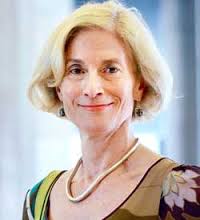
An Interview With Andrea Scarantino (February 2017)
Martha Nussbaum is the Ernst Freund Distinguished Service Professor of Law and Ethics, appointed in the Philosophy Department, Law School, and Divinity School at the University of Chicago. She is a world-renowned philosopher whose ideas on emotions and their roles in social life, developed in dozens of best-selling books and 500 articles, have had a profound influence both in academia and in the world at large. Her work on basic human capabilities, carried out in concert with Indian economist Amartya Sen (1998 Nobel Prize in economics), has changed the way the United Nations measure quality of life in developing nations. Her recent honors include the Prince of Asturias Prize in 2012, the Nonino Prize in 2015, and the Inamori Ethics Prize, also in 2015. She was selected by the NEH to deliver the 2017 Jefferson Lecture in the Humanities. This is the highest honor the federal government bestows for distinguished intellectual achievement in the humanities. Her lecture will take place on Monday, May 1 at the John. F. Kennedy Center for the Performing Arts at 7:30 p.m. The lecture is free and open to the public and will also stream live online at neh.gov.
Where did you grow up? What did your parents do? Do you have a general sense of how early family dynamics have shaped your adult personality?
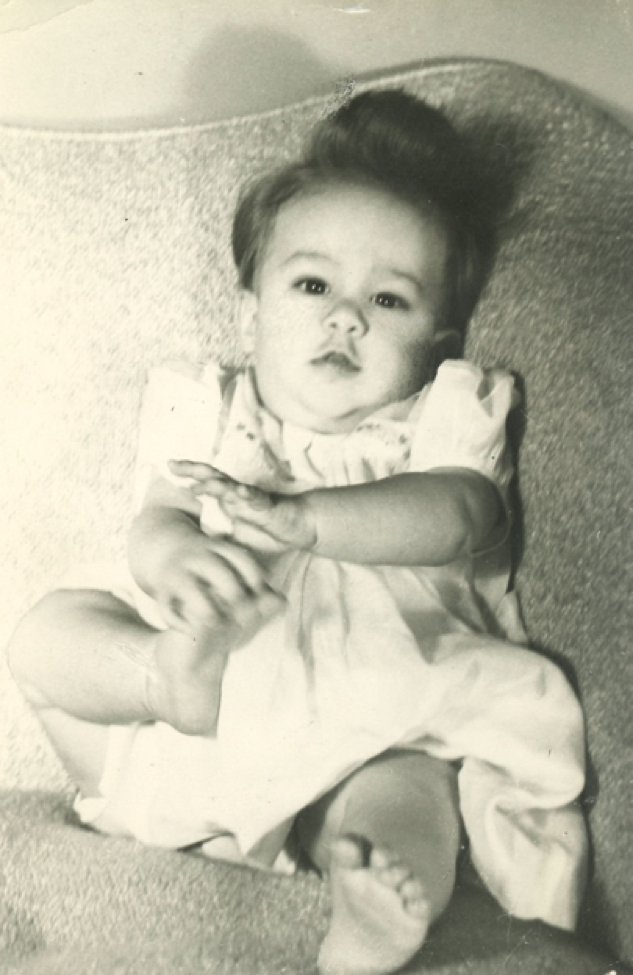
I was born in New York City, but when I was six months old my father took a job with a large Philadelphia law firm, and we moved to the Philadelphia suburbs, first to Wyndmoor (near Chestnut Hill) and then, when I was nine, to Bryn Mawr. In Wyndmoor we rented an apartment over the huge garage of a millionaire named Wharton Sinclair, who had a large estate (now a conference center for the University of Pennsylvania), and he had the manor house and outbuildings of the Earl of Surrey moved brick by brick from Britain to Wyndmoor. The manor house was off limits to our plebeian family, though I think my mother went there once for tea, but I was allowed to roam all over the estate and its woods, and I used to bring all my dolls and books to one unused shed containing discarded sculptures of fish and deer, and sit on the dusty floor and read. I am sure this place shaped my rather romantic sensibility! It was so marvelous to have space, and mystery, and books. No TV until I was eleven!
My parents were very loving. My father had some negative traits: I often mention the racial attitudes he imbibed from his Macon, Georgia upbringing, and by the time I was a teenager we quarreled a lot about that. When I married a Jewish man, he didn’t come to the wedding – though he did meet Alan later on, and liked him, as I had known he would. But anyway, he was a real intellectual and loved ideas. He had wanted to be a scientist, and didn’t get to do that because he had to make money quickly to support his younger siblings, since it was a working class family. So he was practicing law by the time he was 21, and he achieved something very unusual by becoming a partner in a leading Philadelphia firm, something few people with a law degree from Mercer could achieve in those days. His area was tax, and particular federal estates and trusts. He wrote one monograph on the gift tax and one on federal estates and trusts, and he gave lectures for the practicing law institute. He loved me and encouraged me no end.
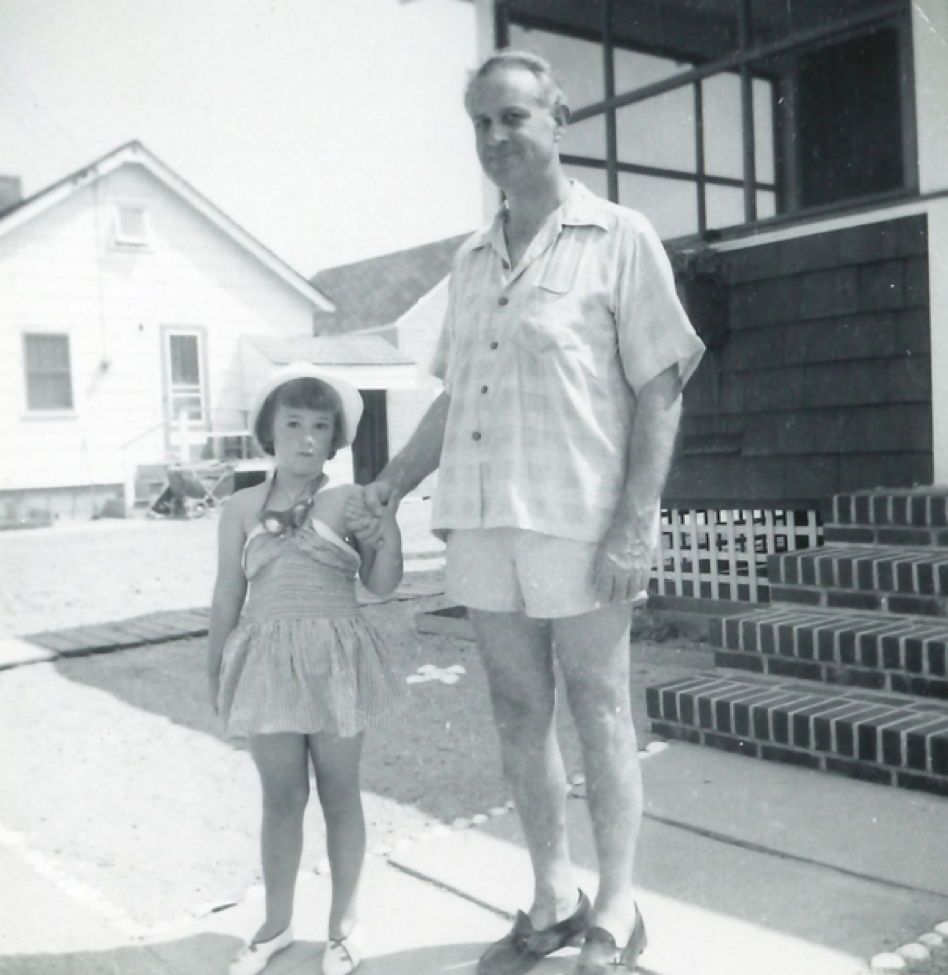
He gave me the sense that hard work and discipline were total fun and pleasure. He had a very strong sense of joy, and used to sing a lot on car trips, or recite Robert Service poems, such as “The Cremation of Sam Magee” and “The Shooting of Dan McGrew.” The latter we even staged, since I loved family theatricals, so I did the piano part, and my sister did the woman who screamed when the lights went out, etc. Much earlier, when I was around seven, he was a good sport playing Colonel Ludington in my dramatic enactment of Ride for Freedom, the true story of Sybil Ludington, who did a ride as long as Paul Revere’s, and over more challenging terrain, at the age of 16. I read this in a kids’ magazine and was totally inspired. I wanted to be that daring girl. So, the family all had to help me act it out, and my mother was also a good sport. Horses were lacking, but I think we had some saw horses in our basement.
So this gives you an idea of my father. He loved effort and will, and would recite William Ernest Henley’s “Invictus” often — also Nelson Mandela’s favorite poem. But my father recited it with a twinkle in his eye, so it was not about grim fortitude, but about the joy of a life fully lived. He also loved fashion, and, within the narrow limits open to a professional man of that time, had great fashion sense. His suits were all tailor-made, and he had about 150 ties. He took me shopping, and I derived the lesson that wearing subversive yet elegant clothes is part of being an intellectual, that one should enjoy color and shape and more generally enjoy life.
I remember one particular pink suit he bought for me at Bergdorf’s when I was around 18, a minidress and a matching coat, and I wore it to his lecture on “Powers of Appointment” for the PLI, as a send-up of that rather grim topic (which he told me was the most boring topic he lectured on), so we had fun creating a mystery, like who was that woman in the pink minidress? We just enjoyed the subversiveness of it. I note that when I gave the John Locke Lectures at Oxford in 2014 I asked a designer I know to make me a bright pink suit for the first lecture. I was not consciously recalling that earlier suit, but I know the spirit was the same: to send up the stuffiness and sexism of Oxford, with humor and panache.
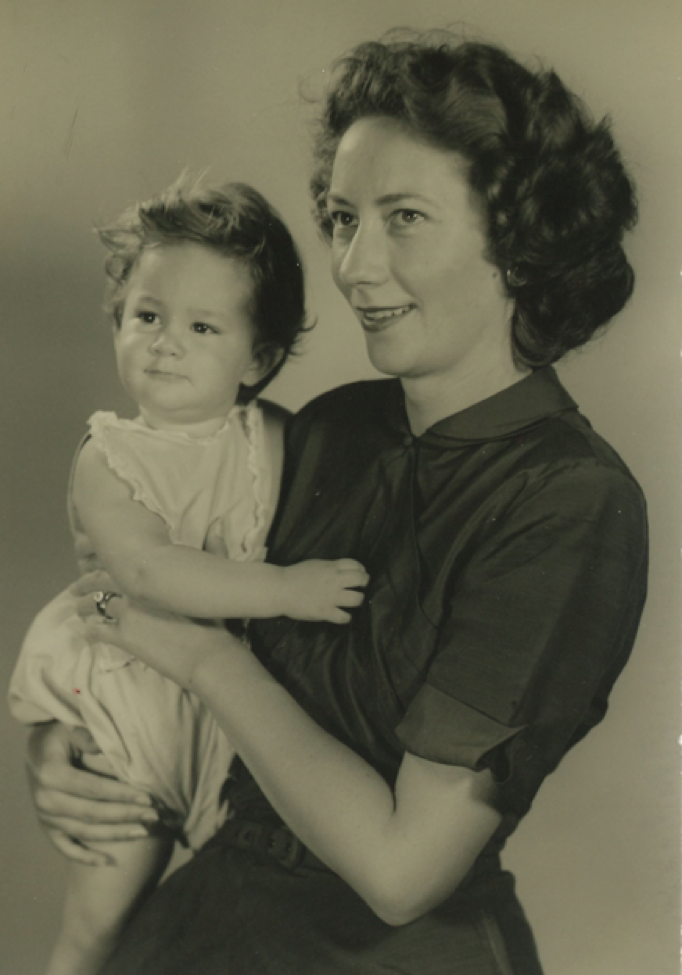
My mother was a very different type of person, and I am so lucky that I had both parents. She was not an intellectual. Her career had been interior design, and she gave it up when she married my father, but she kept it up in our home, very much so. She was a very loving and nurturing person. She curbed my father’s desire to boast about me, which was quite good of her, and good for my future in all sorts of ways; she taught me the equal worth of all people; and she encouraged friendships and emotional expression. My younger sister was very attached to her, and much less so to my father, since he could be quite demanding, and she was a rebellious kid. She is now a first-rate musician, but at that time she seemed like someone who didn’t want to succeed at anything. Well, my mother understood her and loved her, and my father really didn’t quite have a love that unconditional.
Later, after we moved to Bryn Mawr, isolated in the suburbs and without much to occupy her, my mother started drinking heavily, a typical case from the writings of early feminist Betty Friedan (whose The Feminine Mystique spoke eloquently about depression in middle-class women). This made life hard for my sister and me, and it lasted roughly from the time I was ten until the time I got married at 22. She never collapsed, or even appeared totally drunk, it was a quieter sort of drinking, but it impaired her emotions and made us very unhappy. Then she joined Alcoholics Anonymous (AA), and between about 1970 and her death in 1991, she was a leading member, going to national conventions and so forth. What was great about AA was that she got to work helping other people as soon as she was sober, and that way she met many people from different walks of life and acquired an occupation. At her funeral, all these people she had helped stood up to speak about her, and I was so moved, seeing how her capacity for love had won out and created a world for her.
I think it is easy to see someone very disciplined and think that this person is not having fun. But actually, it is only when you have long internalized habits of discipline that you CAN have fun as an academic. It’s a very lonely life after all. Nobody tells you what to do. You must plan your own work. Many people find this incredibly stressful. Because of my father, I find it joyous; and because of my mother and my father (who was loving in his own way) I make room for love. If you are disciplined, then, and only then, as an academic, do you have room for friendship and love. Otherwise you are always fretting about whether you will actually sit down to write. But when you have confidence that you have just finished this thing and you will finish the next, then you can go spend time with the people you care about. So for me, discipline, fun, and love go well together – and preferably with subversiveness and humor.
Were there other important influences in your upbringing? What were your career dreams as you were growing up?
I have to mention the wonderful teachers at my all-women school, The Baldwin School, who gave me relentless criticism and did not let me rest on my laurels at all. I often go back there. I was especially fond of the drama teacher, who really understood emotions, as much of the “Main Line,” that elite WASP area where I grew up, did not: a real bohemian, married to a painter, and so refreshing in that stifling social environment. And my amazing French teacher, Marthe Melchoir, around 4’10”, full of fire, and a total tyrant. Anyone who spoke a word of English in her class had to pay a penny: “Un sou pour le petit chien,” she trumpeted, and extended a piggy bank shaped like a dog. She helped my best friend Sara and me start a French Drama society. We put on plays by Molière and others, but when we were seniors in high school we also wrote our own plays, because we were really fluent in French after years under her tutelage. Sara wrote a play about George Sand and Chopin, and acted the role of George Sand.
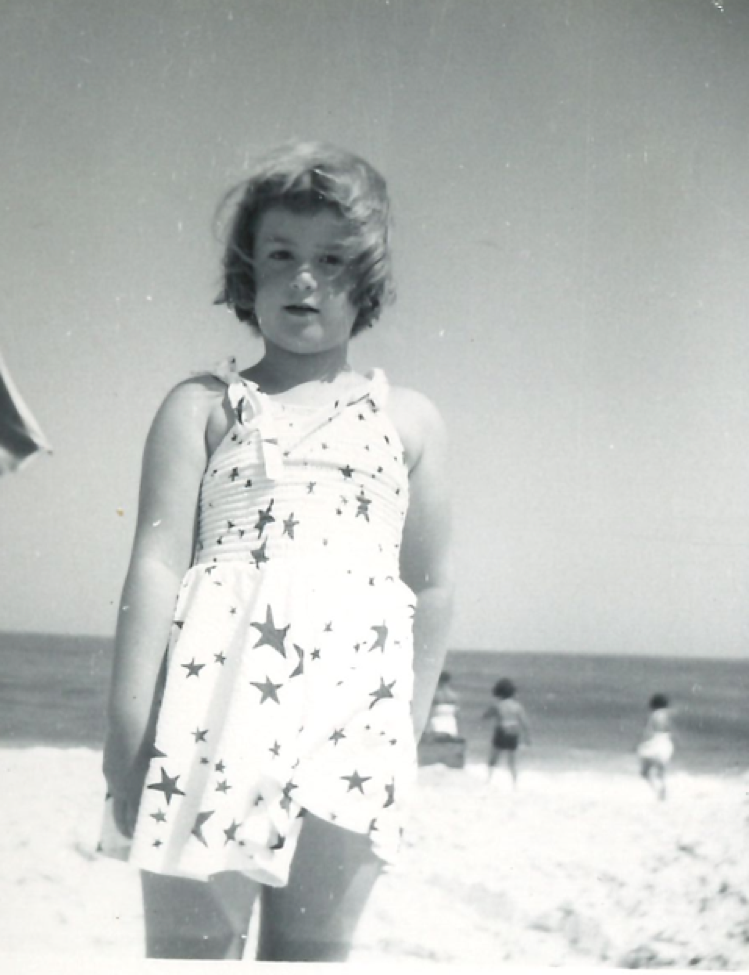
I did a very heavily researched play about Robespierre and his break with the Girondins, including sending his close friend, journalist Camille Desmoulins, to the guillotine. The theme of political virtue fascinated me even then, and the tragic collision between a political ideal and personal friendship. I put what in retrospect I would call Aristotelian sentiments in the mouth of an eventual enemy of Robespierre, Collot d’Herbois, who was revolted by Robespierre’s espousal of abstract perfection while he was indifferent to the fate of his friends. It’s a theme I keep returning to, and I still have that play. Needless to say, I played the part of Robespierre myself. Most of my acting roles were men, since I was the second tallest girl in the class. On one trip back to Baldwin, I saw Marthe Melchoir, then in her mid-eighties, and we spoke about that play and her encouragement of the production. She cackled with delight and said, “Vous voyez, Martha, je suis encore jacobine.”
And then my friends. I always had a special best friend, always women at that time; one between the ages of 6 and 9, then, after we moved, another one who came from a very musical family, and we always did plays and sang duets together. She then changed schools at age 13, and shortly after that Sara arrived, who was my closest friend until I went away to college. We are still in touch. She married a professor of religious studies at Whitman College in Walla Walla, Washington, so she is far away, but very good on email. We loved drama, French drama, and also mischief and plotting, often to puncture the arrogance of boys we did not like.
It won’t surprise you that my career plans were varied: acting, writing, and some type of intellectual endeavor all figured. And you know what? They still do. Whenever we have a law-literature conference we do some drama, and I corral my colleagues into acting and singing. I’ll say more about that later. I was known to other girls as an intellectual. They used to call me “Artha Marguer” because I guess they saw that I liked argument.
At first I followed the intellectual arm of those interests, going to Wellesley College, since most of the great universities did not admit women at that time. I found Wellesley socially and emotionally stifling, and I left in the middle of my second year to take a professional acting job in a repertory theater. After that, for one year, I went to what is now called the Tisch School, the school of theater and film at NYU, in the professional acting program. But then I learned what I’d begun to learn earlier, that professional theater is a horribly competitive world, and not one that makes much room for intellectuals. I also learned that what I really wanted to do was to think and write about plays, not act in them.
So I transferred to the regular part of NYU, majoring in Classics, which I had pursued already at Wellesley, and indeed in my professional acting career as well, since my job was in a repertory company dedicated to ancient Greek drama. I had some wonderful teachers at NYU, and my soon-to-be husband and I could basically make up our own curriculum, since there were very few undergraduates with advanced skills in Greek and Latin. We went to graduate school at Harvard together, he in Indo-European linguistics (he’s now a professor of Linguistics and Classics at Cornell), and I in Classics, shifting later to ancient Greek philosophy but still getting a Classics Ph.D.
You are one of the world’s best known and most celebrated living philosophers, as testified by your 57 honorary degrees and by your reception of the most prestigious honors in philosophy (just in the last two years: Philip Quinn Prize 2015, for outstanding service to the profession of philosophy; Inamori Ethics Prize for Outstanding Ethical Leadership, 2015; Nonino Prize for a “Master of Our Time,” 2015; Kyoto Prize in Philosophy, 2016; NEH Jefferson Lecture, 2017). And yet, your graduate education was not in philosophy but in classical philology. Your PhD dissertation, defended in 1975 at Harvard University, was entitled Aristotle’s De Motu Animalium, and it was more or less the same as the book of that title, published in 1978. What attracted you to classical philology in the first place, and why did you eventually make the transition to philosophy? Is your graduate training in philology to be credited in part for your success as a philosopher, and if so how?
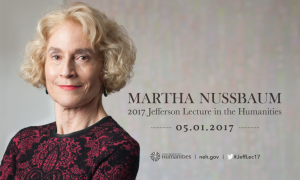 I was attracted to Classics by my love of Greek tragedies and comedies, which I read first in English and then, as soon as I could, in Greek. When I went to graduate school I wanted to write about tragedy – and lo and behold, I did! – but later. Because when I got to Harvard I found that nobody was addressing the deep ideas in the tragedies. Some were editing texts, and others were doing literary criticism of a somewhat superficial and vapid sort. The people who really commanded my respect were G. E. L. Owen, the great scholar of Plato and Aristotle, and Glen Bowersock, the historian. I don’t have a gift for history, but in order to work with Glen I made Tacitus my “special author” in Latin, and I’ve always delighted in Glen’s prodigious learning, his grace, his wit.
I was attracted to Classics by my love of Greek tragedies and comedies, which I read first in English and then, as soon as I could, in Greek. When I went to graduate school I wanted to write about tragedy – and lo and behold, I did! – but later. Because when I got to Harvard I found that nobody was addressing the deep ideas in the tragedies. Some were editing texts, and others were doing literary criticism of a somewhat superficial and vapid sort. The people who really commanded my respect were G. E. L. Owen, the great scholar of Plato and Aristotle, and Glen Bowersock, the historian. I don’t have a gift for history, but in order to work with Glen I made Tacitus my “special author” in Latin, and I’ve always delighted in Glen’s prodigious learning, his grace, his wit.
Harvard was a shocking and repugnant place: anti-semitic, sexist, anti-gay. My change of name from Craven to Nussbaum was much commented on, and my husband was given the cold shoulder. There was a lot of sexism too: I have often told the story of how, when I became the first woman in the Society of Fellows, an eminent classicist wrote me a letter of “congratulation” wondering (archly) what we could call a female fellow. “Fellowess” was too awkward. So maybe the Greek language could solve the problem. Since the word for “fellow” is hetairos, I could (he said) be called hetaira. But of course I knew well, as did he, that that was the term for a courtesan. So, back to Glen: as a openly gay man with a life partner (the eminent scholar Christopher Jones), he was the target of “jokes” of a similar nature, so I felt a bond. Having been a professional actress I knew quite a few gay men and already felt that their exclusion and inequality was a shocking and repugnant fact about my world, so I made a great point of inviting Glen and Christopher over for dinner, and I still feel great delight when by serendipity they turn up somewhere in the world where I am—as once a few years ago in a restaurant in Beirut, when both of us were lecturing on something there.
I remember attending the Mahler 9th with Christopher once, and it was a marvelous experience on account of his keen musical sensitivity. I am sure the seeds of my lifelong passion for gay rights were sown earlier, in my theater days. But Glen and Christopher figure prominently in my decision to bring that issue into my academic work. Glen, you know, was a brilliant Dean at Harvard, and he had all the equipment to have been one of our truly great university presidents. But the glass ceiling was so obvious, it might as well have been a cement ceiling. I note that despite our rapid progress we still have not seen an openly gay man hold an Ivy League presidency, although the great Ralph Hexter, a first-rate Classical scholar whom I had gotten to know in that way, broke through the cement ceiling as President of Hampshire College and now as Interim Chancellor at UC Davis.
And we have to mention the remarkable Biddy Martin, long an outspoken lesbian, who began as a scholar of German literature at Cornell and rose to be Provost there – before going on to be Chancellor of the University of Wisconsin at Madison, and now the President of Amherst College. I think she certainly broke the ceiling for lesbians.
I enjoy friendships with gay men, and the gay studies pioneer David Halperin is among my closest friends. He says I was the one who first steered him to writing about the history of sexuality in Greek antiquity, when he was a young Plato scholar. He has since gone on to more general comparative studies of gay cultures in different times and places. I find that my gay male friends share good taste and are fun to shop with, and share my passion for opera. But I got to know them through our shared work on ancient Greek sexuality.
Ok, so now to Owen, and the world of ancient Greek philosophy. That was an amazing subculture, such exacting scholarship, combined with such a vivid sense of which philosophical issues were the most exciting. The ancient writers were treated like living interlocutors who had something fascinating to say – but not without the most diligent historical and linguistic analysis. It was that combination of philosophical insight and superb scholarship that drew so many excellent younger philosophers to Owen, and I loved the philosophy and the philology both. I never changed my degree program simply because the philology program had tougher exams, and I felt the need to improve my Latin – and a good thing too, since most of my historical scholarship in recent years has been on Cicero and Seneca, and I teach a Latin course every year, right now on “Roman Philosophers on the Fear of Death.”
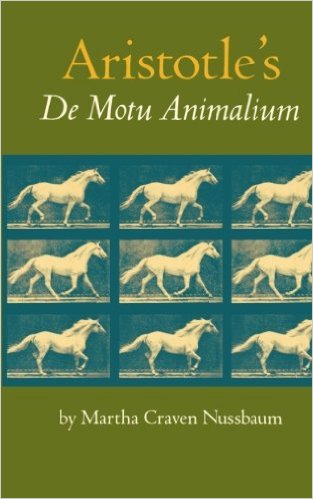 When it came time for my dissertation I chose a topic – editing Aristotle’s De Motu Animalium – where I could do it all. The work is very short, and involves Aristotle’s attempt to give what he calls a “common explanation” of all animal movement. It touches on central issues in Aristotle – the nature of scientific explanation, the role of cognition and desire in explaining behavior, the nature of imagination – but little had been written about its contributions, because for a time the work had been considered spurious. I wrote five philosophical essays on central themes, I edited the text from a new analysis of the manuscript tradition, I translated it, and did a line by line commentary. Textual criticism is a marvelous discipline.
When it came time for my dissertation I chose a topic – editing Aristotle’s De Motu Animalium – where I could do it all. The work is very short, and involves Aristotle’s attempt to give what he calls a “common explanation” of all animal movement. It touches on central issues in Aristotle – the nature of scientific explanation, the role of cognition and desire in explaining behavior, the nature of imagination – but little had been written about its contributions, because for a time the work had been considered spurious. I wrote five philosophical essays on central themes, I edited the text from a new analysis of the manuscript tradition, I translated it, and did a line by line commentary. Textual criticism is a marvelous discipline.
In 2015, Oliver Primavesi, a scholar in Munich who is preparing the first new edition of that treatise since mine, and has newly discovered evidence, including technical apparatus for looking at writing written under other writing that was unavailable to me, wrote to tell me that he has now absolutely confirmed that a bold conjecture I made – that there was a third independent manuscript family – had now had decisive proof. So he very kindly proposed a little conference to celebrate the fortieth anniversary of my dissertation, and we all gathered here in Chicago and celebrated philology.
I gave a little speech to my grad students (we are strong in this area and some of my very best students are working on ancient Greek topics) about how important it Is to know about manuscripts and the principles of textual criticism. So I loved that work. When Bernard Williams visited at Harvard, I began working, with his advice, on what eventually became The Fragility of Goodness, and Williams had a philosophical personality much closer to mine than Owen’s: Owen really didn’t care about moral and political philosophy, and emotions embarrassed him. So, Williams said to Owen that I really should change my dissertation topic and write about tragedy and luck, not “boring old De Motu.” But that was him, not me. I loved De Motu, and I told Bernard that I would do both.
Philosophy has long had a reputation as a work environment inhospitable to women, even though there have certainly been significant improvements on this front over the past few years. Did you face gender-specific obstacles as a woman trying to make a career in a male-dominated discipline?
Well of course in those days every discipline was inhospitable to women. There was only one tenured woman in the whole of Harvard when I arrived there, the classicist Emily Vermeule, and she was in a chair reserved for a woman. I did not expect sexism, because my family was incredibly supportive, my school prepared me for success, and my undergraduate days at NYU were pretty terrific for those days. But Harvard! I felt I had entered a weird world that combined complacent elitism in astonishing ways with gross injustice.
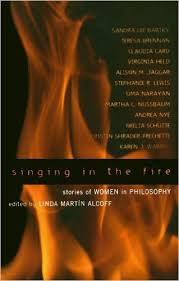 I’ve discussed the problems of sexual harassment and child care I faced at the time in my essay in Linda Martín Alcoff’s Singing in the Fire: Stories of Women in Philosophy. I spent a lot of time on the writing in that essay, since I was speaking of grave matters, but I wanted to do so in a spirit of sassy defiance and optimism. So I will not try to recap all that. I will only add that, although Owen was, as I describe there, a constant sexual harasser, he was the sort who inspired pity more than fear, because he was destroying himself through alcohol; and he did not retaliate against women who said no, since he basically knew that they had made the right choice. I still think his behavior was terrible and did harm, both to the climate of instruction and to people who were very demeaned and insulted by his conduct. I suppose I always felt he was harming himself, not me, and I also understood that he had always been demeaned and insulted himself at Oxford for his lower middle-class Welsh upbringing. So I saw him as basically a victim. Because of my mother I knew the toll alcohol can take on the personality. Sadly, he did not recover as my mother did, but died shortly after his sixtieth birthday.
I’ve discussed the problems of sexual harassment and child care I faced at the time in my essay in Linda Martín Alcoff’s Singing in the Fire: Stories of Women in Philosophy. I spent a lot of time on the writing in that essay, since I was speaking of grave matters, but I wanted to do so in a spirit of sassy defiance and optimism. So I will not try to recap all that. I will only add that, although Owen was, as I describe there, a constant sexual harasser, he was the sort who inspired pity more than fear, because he was destroying himself through alcohol; and he did not retaliate against women who said no, since he basically knew that they had made the right choice. I still think his behavior was terrible and did harm, both to the climate of instruction and to people who were very demeaned and insulted by his conduct. I suppose I always felt he was harming himself, not me, and I also understood that he had always been demeaned and insulted himself at Oxford for his lower middle-class Welsh upbringing. So I saw him as basically a victim. Because of my mother I knew the toll alcohol can take on the personality. Sadly, he did not recover as my mother did, but died shortly after his sixtieth birthday.

And then, all of a sudden, there was Bernard Williams, a real feminist. He was just getting divorced from Shirley Williams, but he had already lived the life of a man who was an equal-time child care provider, and he went on to do the same in his second marriage, to Patricia Williams, a high-ranking editor and a simply wonderful human being with whom I am in touch today. (I dedicated the anger book to Bernard’s memory, and we’ve corresponded about that.) So Williams understood care, and he understood love, and he also had seen up close what women endured. Although there was no sexual harassment policy or procedure, he single-handedly undertook to be that grievance person, and if he could not alter institutions he certainly could tell us that we were correct to feel that our dignity had been insulted and that things must change. I should add that I fell totally in love with him, as I’ve recorded in the long obituary article for Williams that I published in the Boston Review (October 2003) but he behaved in the most appropriate way, respecting his new wife, his supervisor role, and women in general.
One of the distinctive aspects of your philosophical method is its eclecticism, as you creatively combine domains of knowledge that are often kept separate, most significantly philosophy, literature and science. What does philosophy miss out on when it is not combined with literature on the one hand and with science on the other?
I am not overjoyed by the term “eclecticism,” since, at least to me, that suggests a lack of a central rationale. “Interdisciplinary” is the term that I would favor. I think any philosopher who works on the emotions needs to be aware of developments in cognitive psychology, neuroscience, anthropology, and psychoanalysis. I totally agreed with ISRE for supporting communication and dialogue as essential for progress. (Not everyone will be willing to include psychoanalysis, but let people judge for themselves, in terms of the insights I derive from that.)
![]() ISRE has been an important force for intellectual progress. By now philosophy is quite well-informed, though not always about cultural differences or developmental trajectories. I have to say that the other disciplines don’t always care about philosophy or take care to define their concepts in a philosophically rigorous way. Some experiments are deeply flawed by this failure (see my critique of Schachter and Singer in Political Emotions.) So I read widely but select certain “heroes” who seem especially trustworthy because of their conceptual rigor: Dan Batson, Paul Rozin, and in neuroscience, Joseph Le Doux. (This is not an exclusive list, so please do not infer criticism of people I have omitted.) Philosophy needs to check its insights against what science has found, or it will be prone to error.
ISRE has been an important force for intellectual progress. By now philosophy is quite well-informed, though not always about cultural differences or developmental trajectories. I have to say that the other disciplines don’t always care about philosophy or take care to define their concepts in a philosophically rigorous way. Some experiments are deeply flawed by this failure (see my critique of Schachter and Singer in Political Emotions.) So I read widely but select certain “heroes” who seem especially trustworthy because of their conceptual rigor: Dan Batson, Paul Rozin, and in neuroscience, Joseph Le Doux. (This is not an exclusive list, so please do not infer criticism of people I have omitted.) Philosophy needs to check its insights against what science has found, or it will be prone to error.
You mention literature, but actually literary works are sources of both error and truth, since they emerge from cultures that are often unjust. So for normative ethics we should trust literature only with careful preselection. As you see in Upheavals of Thought, I reject the insights of most of the literary works I examine in Part III, though their errors are instructive and help us approach truth. For descriptive insights things are better, since much literature does aim to portray human experience and can therefore test our theories better than our ad hoc personal intuitions, since novels are typically written for a broad audience, and must be recognizable to that audience. However, the main use I have for literature in the theory of emotions is as an ally of psychoanalysis. I find that many people who won’t take seriously the work of great theoretical psychoanalysts such as Donald Winnicott or Ronald Fairbairn (both in the “object-relations” school, the branch of psychoanalysis that interests me most) will respect similar insights when they are located in Proust. So I lean on Proust, since I want to get to the truth, and I do believe that Proust is a great descriptive psychoanalyst, although his normative views of love, as I record, are deeply flawed.
 In political philosophy there is also an urgent need for interdisciplinary cooperation, which is the main rationale for the Human Development and Capability Association, the association started by a group of younger economists and philosophers who thought there should be an ongoing home for regular dialogue about the approach that economist Amartya Sen (Nobel Laureate for 1998) and I had pioneered. Sen and I are its two “Founding Presidents,” and its function is to bring people together from many countries and also across disciplinary divisions, to stimulate high-level work about (including criticism of) the “Capabilities Approach” that we began. Political philosophers need to learn history and politics if they are to make useful recommendations for a complicated world, and they had better be in close conversation with economists if they want their proposals on global development to win a hearing. Once again, these other disciplines are better on the descriptive front than on the normative. The normative conceptions embedded in neoclassical economics are highly questionable, and need constant skeptical prodding.
In political philosophy there is also an urgent need for interdisciplinary cooperation, which is the main rationale for the Human Development and Capability Association, the association started by a group of younger economists and philosophers who thought there should be an ongoing home for regular dialogue about the approach that economist Amartya Sen (Nobel Laureate for 1998) and I had pioneered. Sen and I are its two “Founding Presidents,” and its function is to bring people together from many countries and also across disciplinary divisions, to stimulate high-level work about (including criticism of) the “Capabilities Approach” that we began. Political philosophers need to learn history and politics if they are to make useful recommendations for a complicated world, and they had better be in close conversation with economists if they want their proposals on global development to win a hearing. Once again, these other disciplines are better on the descriptive front than on the normative. The normative conceptions embedded in neoclassical economics are highly questionable, and need constant skeptical prodding.
You have often characterized your theory of emotions, most systematically described in Upheavals of Thought, as Neo-Stoic. The Stoics had a complex theory of emotions as judgments of appropriateness. Just to give a couple of examples, they took fear to be “the judgment that there is a bad at hand and that it is appropriate to avoid it” and appetite to be “the judgment that there is good at hand and that it is appropriate to reach for it” (Sorabji 2000, 30). In Upheavals, you also write that ‘[e]motions are appraisals or value judgments’. How is your theory of emotions similar to the original Stoic theory, and how does it differ from it? Also, does your notion of appraisal differ from the notion of appraisal used by contemporary appraisal theorists in psychology to designate the mental process that causes an emotion (rather than the emotion itself)?
 I am not at all sure why you begin with Richard Sorabji’s reconstruction of Stoicism, which is very different from my own. Had we not been writing at the same time, I would have devoted attention to why his view doesn’t get the texts right. (I note that Sorabji is a great scholar and a prince among men, so this criticism is meant to be combined with the highest respect.) Surely it would be unfortunate if the Stoics had defined emotions in the circular way he proposes, in which emotion is defined in terms of the thought that it is right to have an emotion. But anyway, I believe they don’t define emotion that way. And since we’re discussing my own Neo-Stoic theory, we had better begin with what I take the Stoics to say, as argued in Therapy of Desire.
I am not at all sure why you begin with Richard Sorabji’s reconstruction of Stoicism, which is very different from my own. Had we not been writing at the same time, I would have devoted attention to why his view doesn’t get the texts right. (I note that Sorabji is a great scholar and a prince among men, so this criticism is meant to be combined with the highest respect.) Surely it would be unfortunate if the Stoics had defined emotions in the circular way he proposes, in which emotion is defined in terms of the thought that it is right to have an emotion. But anyway, I believe they don’t define emotion that way. And since we’re discussing my own Neo-Stoic theory, we had better begin with what I take the Stoics to say, as argued in Therapy of Desire.
I think that for the Stoics an emotion is the acceptance of a proposition whose content combines an object with a thought of deep importance for the person’s flourishing (eudaimonia), and both of these with some further thoughts about the current fortunes of the object. I’ll  elaborate these points further below. (It is thus very similar to the views that Richard Lazarus and Andrew Ortony have advanced in psychology, since both, rejecting the behaviorist view of emotions, have stressed the importance, in emotion, of awareness of an object that is taken to have considerable significance for the creature’s flourishing.) Grief, for example, has as its content something like, “My mother, who is absolutely central to my life, is gone.” That judgment doesn’t say that it is “right to get upset”: rather, the full acceptance of that alarming proposition, namely that someone central to your life is gone, Is the upheaval, like a wound in the self. As Seneca’s Medea says, betrayed by her husband and seeking to take revenge: once you love someone else, “there is a space open for a wound.” In that case, she relies on the fact that Jason’s high valuation of the importance of their children for his own flourishing, combined with news of their murder (by her), will tear him apart.
elaborate these points further below. (It is thus very similar to the views that Richard Lazarus and Andrew Ortony have advanced in psychology, since both, rejecting the behaviorist view of emotions, have stressed the importance, in emotion, of awareness of an object that is taken to have considerable significance for the creature’s flourishing.) Grief, for example, has as its content something like, “My mother, who is absolutely central to my life, is gone.” That judgment doesn’t say that it is “right to get upset”: rather, the full acceptance of that alarming proposition, namely that someone central to your life is gone, Is the upheaval, like a wound in the self. As Seneca’s Medea says, betrayed by her husband and seeking to take revenge: once you love someone else, “there is a space open for a wound.” In that case, she relies on the fact that Jason’s high valuation of the importance of their children for his own flourishing, combined with news of their murder (by her), will tear him apart.
I believe that my notion of appraisal is the same as that used in the psychologists I cite and study, though psychologists, like philosophers, often use key terms in different ways. One difference from some would be that I think all moving animals are capable of appraisal, and I think Lazarus agrees with this, but others do not, for example Zajonc in his debate with Lazarus, although I think that at crucial points they are talking past one another. (Typically people who spend their lives studying animals are convinced that they are capable of many appraisals, and I have learned a lot from the work of Frans De Waal, and from other scientific work on apes, elephants, whales, and dolphins. (My daughter is an animal law attorney, and we work on these issues together.)
My theory agrees with the Stoics in holding that: (1) emotions always have an object; (2) the object is an intentional object, that is to say, it figures in the emotion as the creature itself sees it (thus one might grieve on the basis of false information); (3) the directedness toward an object is typically combined with beliefs about the fortunes of the object, whether it is doing well or badly, whether it is threatened or safe, etc. (in the case of animals we then have to argue about what “belief “ is, but let’s postpone that); (4) these beliefs or whatever we shall call them appraise or evaluate the object as important; and (5) this importance is importance relatively to the person’s own conception of eudaimonia. (Thus one might believe that all human beings are of equal worth and yet grieve for the deaths of only a few of them, those to whom one is attached – the source of much moral difficulty.)
In addition, for the vast majority of the cases, the emotions perceive their object as under the sway of fortune and mutability, not unchanging or under the full control of one’s rational will. I believe that wonder and awe are exceptions to this point: those emotions may be directed at objects such as God or permanent features of the world of nature that the person does not see as mutable. But the Stoics do not discuss those emotions (which may not even be eudaimonistic). Spinoza, who does discuss them, thinks that they are exceptions to his general argument that emotions are bad forms of dependency on the mutable world.
That was the core account that I presented in Upheavals, ch. 1, saying very explicitly that it was a crude sketch to be modified by subsequent chapters. We do not get the full theory until the end of chapter 5. So it is astonishing to me that philosophers have classified my approach as “judgmentalist,” showing that they have not read beyond chapter 1. It’s ok to put a book down if you don’t like it, but not to write about the person’s theory without doing the requisite work.
In chapter 2, I say that the Stoic view needs very basic modification in order to do justice to the emotions of non-linguistic creatures such as infants and non-human animals. I hold, and show evidence for, the view that all moving animals (in other words not committing myself about sponges and molluscs) have emotions, which are important in explaining their movements. Most scientists working closely on animals now agree, and a major part of my current work being on animal rights, I follow this literature closely. So what changes do we need?
First, the attitudes cannot be envisaged as involving a linguistically formulable proposition, and the beliefs aren’t propositional in form if that means linguistically formulable. What we need is a looser and more inclusive notion of predication or combination: emotions combine perception of an object with some processing of information about the current fate of the object. (For me, “cognitive” means only “involving the processing of information,” whereas Jesse Prinz has a far more exacting definition of “cognition.”) So, for example, the fear of a deer as the wild dogs are charging and about to leap involves a perception of this pack (I leave to others the question of what specific concepts we should ascribe to the deer), combined with the idea that this pack is bad for me, and this bad thing is imminent. (Some philosophers would think this sufficient for the ascription of a “belief,” some would not.)
 So, that is the first modification, and we then would do specific research on the neuroanatomy of particular creatures to determine how sophisticated their perceptions might be. (Very specific, in some cases. Thus elephants can identify strange bones as elephant bones and grieve for the dead, even without knowing the individual as a member of their herd. According to Hal Whitehead and Luke Rendell, whales can have thoughts something like, “Hey, that’s a cool new song and I want to learn to sing it right now.”)
So, that is the first modification, and we then would do specific research on the neuroanatomy of particular creatures to determine how sophisticated their perceptions might be. (Very specific, in some cases. Thus elephants can identify strange bones as elephant bones and grieve for the dead, even without knowing the individual as a member of their herd. According to Hal Whitehead and Luke Rendell, whales can have thoughts something like, “Hey, that’s a cool new song and I want to learn to sing it right now.”)
In chapter 3, I introduce the second modification: in human species, emotions are relative to a culture, and derive a good deal of their specific content from the surrounding culture, and I then go into detail about the different ways culture influences emotion. I now think that this cultural richness pertains, as well, to whales, dolphins, apes, and elephants. Whitehead and Rendell’s book The Cultural Lives of Whales and Dolphins offers a rigorous argument that in at least some cases these species exhibit culture (which they carefully define after going through all the prominent definitions), which would mean that their emotions do too, as in the case of the new song, which produces delight.
In chapter 4, I modify the view yet further by showing that the emotions of an adult human being bear traces of an infantile past: the present object is typically a collage of past objects. It’s here that Proust becomes very important for me. The specific history of human beings profoundly influences the emotions they have and how they interweave, and sets humans up for many difficulties in life, as when the person you think you love is seen by you as a vague image of your parent.
In chapter 5, turning to music, one of my great passions, I show how all these modifications help us solve some problems that many philosophers have tried to solve concerning the emotional content of music.  For our purposes, the new theoretical contribution of this chapter is the fact that even very sophisticated emotions of a human adult may not be linguistically formulable, but formulable, or more accurately formulable, in musical terms. Here I draw on Mahler’s insightful discussions of how his symphonies seem to demand a verbal map of the emotions that they express, and yet this verbal account always turns out to be what he calls a “stammering translation” into a different medium. In other words, there are musical ways of making the nuances of an emotion precise that do not exactly correspond to any linguistic formulation. And I note that this insight helps us vindicate Schopenhauer’s judgment that music has a particularly deep connection to the emotions. Language is used every day, and easily becomes shopworn, and it takes a poet to recall it to its freshness, its ability to embody eudaimonistic insights in a meaningful way. Music is not as shopworn, and thus may cut straight to the heart.
For our purposes, the new theoretical contribution of this chapter is the fact that even very sophisticated emotions of a human adult may not be linguistically formulable, but formulable, or more accurately formulable, in musical terms. Here I draw on Mahler’s insightful discussions of how his symphonies seem to demand a verbal map of the emotions that they express, and yet this verbal account always turns out to be what he calls a “stammering translation” into a different medium. In other words, there are musical ways of making the nuances of an emotion precise that do not exactly correspond to any linguistic formulation. And I note that this insight helps us vindicate Schopenhauer’s judgment that music has a particularly deep connection to the emotions. Language is used every day, and easily becomes shopworn, and it takes a poet to recall it to its freshness, its ability to embody eudaimonistic insights in a meaningful way. Music is not as shopworn, and thus may cut straight to the heart.
I am writing a lot, lately, about opera, I develop these insights further, showing how the musical dimension of (say) a Mozart opera can add greatly to the emotional texture of what the libretto sometimes presents in only a skeletal way. And in a long article on “Mercy in Music,” forthcoming in the Oxford Handbook of Music and Philosophy, I argue that although we could not recognize mercy without some sort of plot conveyed in words, once the plot lines are laid down, the mercy may be communicated purely through music. I use a variety of examples to study this point, including Mozart’s La Clemenza di Tito, Puccini’s Suor Angelica, and Britten’s War Requiem.
Your first best-selling book was the The Fragility of Goodness: Luck and Ethics in Greek Tragedy and Philosophy. The book introduced two major themes of your life’s work. First, the idea that vulnerability is an essential and valuable feature of human life. Second, the idea that emotions play a central role in manifesting our vulnerability. Can you briefly explain what is good about vulnerability and how emotions are connected to vulnerability? Have you often felt vulnerable in your own personal and professional life, and do you find those moments especially life-affirming?
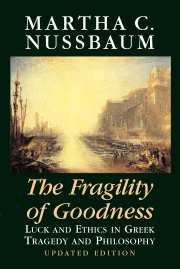 Actually Fragility does not say that vulnerability is in general a good thing, although it is often read that way. I was perhaps not clear enough, and most of my subsequent work has been an attempt to sort out what types of vulnerability are valuable and what types are pernicious. In Fragility and Therapy of Desire I was confronting philosophical views that urged us to get rid of all vulnerability by not attaching importance to anything we can’t control.
Actually Fragility does not say that vulnerability is in general a good thing, although it is often read that way. I was perhaps not clear enough, and most of my subsequent work has been an attempt to sort out what types of vulnerability are valuable and what types are pernicious. In Fragility and Therapy of Desire I was confronting philosophical views that urged us to get rid of all vulnerability by not attaching importance to anything we can’t control.
On Aristotle’s behalf, I responded by saying (a) that even the activities that seem most under our control, thinking and contemplating, are not totally so. Not much thinking goes on, says Aristotle, when you are being tortured, and nobody would say that it could, “unless he were defending a philosophical position at all costs.” Thinking needs nutrition, health, political non-persecution, a stable livelihood, and so forth. And (b) some activities through which people incur very deep and obvious vulnerability – friendship and personal love, family love, political attachments and activities – have intrinsic importance, and a life without them is just not a flourishing human life. Aristotle even says that “one would not choose to live without friends, even if one had all the other good things of life.”
So that is my basic position, then and now: all human activities are vulnerable in some ways, since we are embodied beings; and some of the most particularly vulnerable ones are crucial to life’s value. But that does not entail that all forms of vulnerability are good or that one should seek to maximize vulnerability as if it were a value in its own right. No child should be vulnerable to hunger or violence, no citizen should lack stable health care. No woman should have to walk in fear of sexual assault. My capabilities approach is basically an attempt to describe the bad forms of vulnerability that a good society should prevent for its citizens, insofar as possible, thus creating space within which the good sorts of vulnerability can flourish. (There’s not much room for friendship when you are homeless and desperate for a square meal.) Even with respect to the good things, one would not, I think, seek to maximize vulnerability. When one chooses friends wisely, as Aristotle and Cicero both note, one looks for deep traits that are not so likely to change with time. And that is not an error. You can’t control the health and happiness of your children, but you can certainly try to set their lives on a stable course.
OK, now to emotions. What the Stoics understood very well (and this is a big part of Therapy of Desire) is that our emotions are responses to valued and yet uncertain external objects (external relative to the will, since emotions can certainly be about the state of one’s own body). They chart the fortunes of the things and people we care about. Fear embodies the thought that something or someone very important is threatened; hope is fear’s cousin, reporting that a good outcome might possibly ensue. Almost always, as Seneca insists, the two go together. Then there are love and grief: if you love someone, then you cannot avoid deep grief, whether at a death or in a breakup or divorce. Loss and love go hand in hand.
I started Upheavals with the story of a person sort of like me whose mother dies (it’s a philosophical example a la Seneca, not autobiography). The reason I chose a parent is that every reader has had that experience, if not with a parent, then with a grandparent, or guardian of some type. If I’d chosen a child, readers might think, “Oh, my child will die long after I’m gone.” So I wanted to make the point that cultivating deep attachments makes one vulnerable to grief. Anger and gratitude are responses to the way other people treat the things and people one values: sometimes good, sometimes bad. Insofar as you care whether other people treat you well or ill, you have hostages to fortune. It was not for nothing that Lucretius, imagining really perfect beings outside of our world, wrote, “They are not captives of gratitude for benefits, nor are they tainted by anger.” Envy, jealousy, all the major emotions have this structure of need and dependency.
Obviously I’ve encountered grief and loss. Both of my parents have died, as did, much later, my grandmother. The deaths of my parents, at ages 71 and 76 respectively, were very painful. They were a huge part of my life; also, I felt that they should have lived much longer. Since my grandmother lived to be 104, I felt less grief, and tended rather to congratulate her, since she kept her health and her mental faculties to the end. But of course it was still a loss. When I break up with someone after a long and deep relationship, that is also a terrible loss, almost like death, requiring mourning and a reweaving of one’s life.
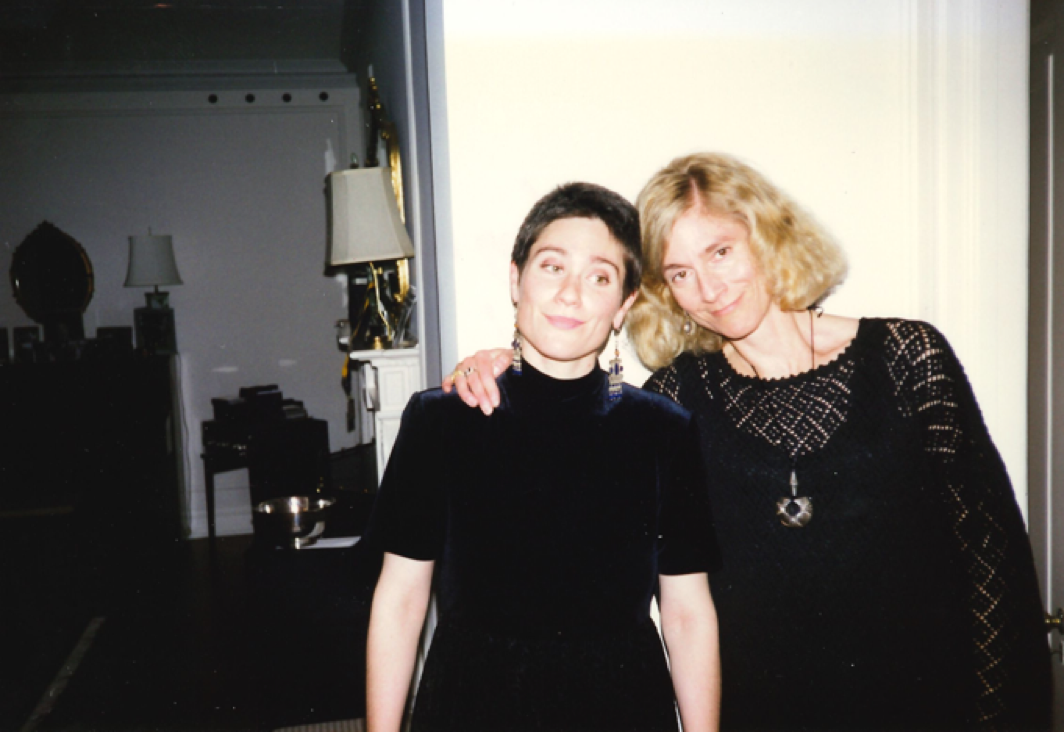
And of course being a mother, even of a most wonderful and delightful and gifted daughter, sets one up for many sleepless nights! But yes, of course that is life-affirming. The grief and anxiety register the depth of the commitment. And when political events take place that upset me, well, again, that upset takes the measure of the commitment.
One grief that was not life –affirming was not getting tenure at Harvard. It was a huge mess: philosophy voted narrowly yes, classics voted narrowly no. Sex discrimination was a big factor. It should not have happened.
When I had an offer from Harvard in 2008, they all said to me, “This will rectify that injustice.” (And I remember that the great scholar Albert Henrichs, who is now terminally ill, and for whom I’m just now writing a small contribution to an honorific volume, said it most sincerely and feelingly.) Imagine that, the same ones who had voted against me were apologizing. For about a day I found that moving. But then I thought, that’s the past, and my decision is about the future: do I really want to go to that diseased and self-complacent place? (And I say this in full recognition of the great scholars it contained and contains.)
The vulnerability that is useless is the sort that comes from things that are not worth getting upset about, like the many examples of stupid anger that I depict in Anger and Forgiveness. I am pretty prickly about imputations of weakness or incompetence by strangers, especially if I think it’s about either gender or age.
Another distinctive aspect of your philosophical work is its ambition to have practical import. In your The Therapy of Desire: Theory and Practice in Hellenistic Ethics, you cite approvingly Epicurus’ claim that “empty is that philosopher’s argument by which no human suffering is therapeutically treated”. On this view, the point of philosophizing is to contribute to solving the most painful problems of human life. Do you think that contemporary philosophers should embrace this Hellenistic ideal more? Do you see yourself as a sort of therapist when you teach philosophy? Should philosophers take a more public role in society to meet Epicurus’ test, and why do they rarely do so, at least in the USA?
I don’t have a view about what other people ought to do. They should do what they love and what brings them joy. Most parts of philosophy are not directly practical and I do not think that someone whose passion is for the philosophy of physics should do political philosophy just to make a practical contribution. I do think that every human being should make some contribution to the future of humanity somehow, but there are so many ways of doing that: political engagement, giving money, teaching, raising children. You don’t have to do it through your writing.
I do think that political philosophy in both the Western tradition and any non-Western traditions I know anything about has always aimed to give normative guidance for political practice, and all of our great political philosophers did that: Aristotle, Rousseau, Kant, Bentham, Mill, Sidgwick, Rawls. So I do think that it makes sense for contemporary political philosophers to find ways of emulating them. That means writing at least some work for the general public — as Sidgwick, for example, wrote two types of works, popular and academic, and even Kant wrote with great simplicity and lucidity in essays for the public at large.
Hegel was the one who missed the boat, in the sense that his undoubtedly important works are impenetrable except by academics. Goethe took him to task for that, but to no avail. John Rawls was not a public speaker, because of his speech impediment, and he felt that he was not good at journalistic writing. One day at lunch he urged me to devote part of my energy to writing and speaking for a broader public: if you can do it, he said, you have a moral duty to do it. I recall that lunch (in Bartly’s Burger Cottage, a Harvard square hangout) very vividly, and I try to follow that advice. For example, after giving the lectures that later became Upheavals of Thought, a detailed philosophical project I adored, I deliberately turned to a book, Cultivating Humanity, that addressed a crisis in higher education and tried to intervene in a useful way.
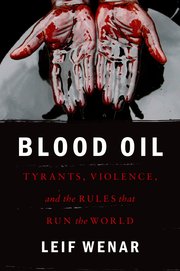 I worry that young philosophers today simply do not learn to write very well. This problem has grown larger lately, when young philosophers are less inclined to read literature. People should work on this, if they do really want to change the world. Think of Leif Wenar’s recent Blood Oil. That, to me, is a superb example of how a philosopher should write for a general public: vivid, punchy, urgent, and at the same time rigorous and factually precise. I try to do the same sort of thing in Women and Human Development and Creating Capabilities, but I have to give him the good writing prize. I guess my best writing is typically in my more poetic moments, as in Upheavals of Thought.
I worry that young philosophers today simply do not learn to write very well. This problem has grown larger lately, when young philosophers are less inclined to read literature. People should work on this, if they do really want to change the world. Think of Leif Wenar’s recent Blood Oil. That, to me, is a superb example of how a philosopher should write for a general public: vivid, punchy, urgent, and at the same time rigorous and factually precise. I try to do the same sort of thing in Women and Human Development and Creating Capabilities, but I have to give him the good writing prize. I guess my best writing is typically in my more poetic moments, as in Upheavals of Thought.
There are many ways to change the world as a philosopher, apart from writing like Leif Wenar. You can have a blog, or a Twitter account. I do not read blogs or write for them (except rarely on invitation), and I do not use any social media, so I don’t know how much political philosophers are doing there. We all teach, and that is surely a way to change the world. I love it when a former undergraduate of mine does something great in politics: for example the marvelous Ro Khanna, just elected to Congress in a district that includes Silicon Valley but also some extremely poor districts. Since he was an undergraduate I’ve known he has the political skill to do something big, and now let the ascent begin! And of course one can create a movement or organization. Wenar does this with his Clean Trade website. Sen and I have done it with the Human Development and Capability Association, an international association with a journal, annual meetings, and much more. It currently has around 800 members in 80 countries. Its main aim is to stimulate good work that crosses national boundaries, youth-age boundaries, and the big theory-practice boundary. Networking is its most productive function.
 I would also like to mention that countries vary greatly in the openings they give to philosophers who would like to address the public culture. In terms of writing for newspapers or doing press interviews, the best in my experience are India, Italy, Germany, and Belgium. The most difficult is the U. S. And the prize goes to The Netherlands, where there is a general-interest philosophy magazine that sells 10,000 copies per month, philosophical cafes that working adults eagerly seek out, and great support for translation. Every single book of mine except the De Motu book has been translated into Dutch, even though people know English: but they want to study the book more closely. I was just there to do a book tour for my Dutch publisher, apropos of the translation of the anger book, and I gave four lectures in four cities. The average attendance was 700, even though they sold tickets, and in some cases required people to buy the book! And I was on the Dutch equivalent of 20/20 with Ian Buruma; I’ve never been on a show like that in the US.
I would also like to mention that countries vary greatly in the openings they give to philosophers who would like to address the public culture. In terms of writing for newspapers or doing press interviews, the best in my experience are India, Italy, Germany, and Belgium. The most difficult is the U. S. And the prize goes to The Netherlands, where there is a general-interest philosophy magazine that sells 10,000 copies per month, philosophical cafes that working adults eagerly seek out, and great support for translation. Every single book of mine except the De Motu book has been translated into Dutch, even though people know English: but they want to study the book more closely. I was just there to do a book tour for my Dutch publisher, apropos of the translation of the anger book, and I gave four lectures in four cities. The average attendance was 700, even though they sold tickets, and in some cases required people to buy the book! And I was on the Dutch equivalent of 20/20 with Ian Buruma; I’ve never been on a show like that in the US.
But once in a while the US does come through: a long blogpost I wrote about the emotions of our political crisis turned into a book proposal, and I got a large advance from Simon and Schuster, so now I have to write that book. Its provisional title is Powerlessness and the Politics of Blame: A Philosopher Looks At Our Political Crisis. That will also be the title of my National Endowment for the Humanities Jefferson Lecture, to be delivered at the Kennedy Center in Washington this May. This work will be fun, because I have new ideas about emotions, putting fear in a much more central position than I did previously, and developing an account of when and why anger and disgust turn toxic. I was in Japan for the Kyoto prize when the election happened, so I felt pretty isolated, unable to commiserate with my friends. So I sat and wrote, and I hope I am beginning to turn my grief into something constructive. Moreover, I am giving the Jefferson Lecture for the NEH this May, on the same topic, so that is at least one chance to have a large public Washington audience.
The clearest example of how your philosophical work has had a practical impact concerns your analysis of basic human capabilities, carried out in concert with Indian economist Amartya Sen (1998 Nobel Prize in economics). This work has changed the way the United Nations measure quality of life, shifting the focus from aggregate measures of economic wealth to measures of the extent to which governments secure to their citizens the satisfaction of some “basic capabilities”. Your influential list of ten basic capabilities includes, among others, being able to live a life of normal length, having adequate health and nutrition, being able to exercise one’s mental capacities, being able to form an individual conception of the good, being able to enjoy recreational activities, being able to form attachments with both humans and animals, being able to play, and being emotionally healthy. What is the basic argument as to why governments should guarantee a minimum threshold of these capacities to their citizens? Secondly, why did you feel the need to add emotional health to the list of basic capabilities? Third, are there not going to be cultural differences concerning what counts as emotionally healthy in a given society, reflecting for instance the degree to which a society favors individualism (e.g. USA) or interdependence (e.g. Japan)? Fourth, isn’t there a serious worry that explicitly putting the government in charge of the emotional health of its citizens may lead to unwelcome side effects such as invasions of privacy or even totalitarianism (e.g. should there be governmental TV channels, given the unparalleled impact TV has on shaping public emotions?)?
Sorry, if you don’t mind, let’s get the terms straight. I use the term “basic capabilities” to refer to the innate unshaped equipment with which people come into the world. “Internal capabilities” are then those nascent abilities shaped into readiness through nurture, nutrition, and so forth, all of which requires political action (compulsory education, health policies, etc.). But internal capabilities might be present and yet people are not in a position to choose to act on their abilities: as when one has employment-related skills, but there are no jobs; or education but there is no freedom of speech. “Combined capabilities” are internal capabilities plus the social and political circumstances that make their exercise truly available. The Central Capabilities on my list are defined as “combined capabilities.”
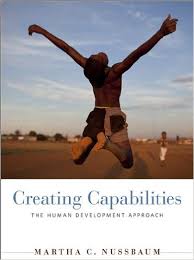 The argument proceeds in two steps: first, Sen and I both defend capabilities as the appropriate space of comparison, by specific arguments addressing the claims of GDP, average household income, preference-satisfaction, and all-purpose resources. Those are long arguments and quite familiar, so I will leave people to find that in my Creating Capabilities. Next I raise the question, if we are going to make a constitution, or in some other way define citizens’ basic entitlements, how should we proceed? What capabilities will we focus on? Constitutions have to make judgments of centrality and importance. No constitution says “maximize human capability.”
The argument proceeds in two steps: first, Sen and I both defend capabilities as the appropriate space of comparison, by specific arguments addressing the claims of GDP, average household income, preference-satisfaction, and all-purpose resources. Those are long arguments and quite familiar, so I will leave people to find that in my Creating Capabilities. Next I raise the question, if we are going to make a constitution, or in some other way define citizens’ basic entitlements, how should we proceed? What capabilities will we focus on? Constitutions have to make judgments of centrality and importance. No constitution says “maximize human capability.”
At this point, on the one hand I invite people to imagine a life without a sufficient level of X or Y or Z: and I ask, Is this a life worthy of the dignity of a human being? (I say human, but please note that elsewhere I extend the approach to all sentient beings, all of whom have their own types of dignity.) This part of the argument is intuitive. It has to proceed case by case. I then work in the other direction, deriving empirical support from the most respected constitutions of the world, such as India and South Africa, looking at what intelligent political planners have seen fit to mark as central. Similarly I look at a variety of human rights documents, such as the Universal Declaration of Human Rights, the Convention on the Elimination of All Forms of Discrimination Against Women, and others. The list also corresponds closely to what Sen and other capability theorists emphasize and think central, though they do not make a list. My list is provisional and humble. It will not be enacted unless people in some nation decide to do so: it is a template for persuasion in the international community.
Let me take your third question next. All the capabilities on my list are specified vaguely, precisely in order to leave lots of room for citizens in a given nation to make them more specific in accordance with their traditions. There is flexibility, but it isn’t limitless: thus it would not be admissible for a nation to say, “We’ll have free speech for men only.” Ideas of equal human dignity and equal respect enter into the argument constantly. But still, there is meant to be room for plurality. Moreover, the whole conception is a form of Rawlsian “political liberalism”: it is not a comprehensive view of the flourishing life, but a partial political module introduced only for political purposes. Citizens are encouraged to persist in their religious and secular comprehensive doctrines, so long as they do not trample on the rights of others.
OK, now to emotions. You say “add” to the list as if there were an antecedent list and I put that in. But really, I invented the entire list. So why emotional health? I think you are imagining the wrong thing here. Let me illustrate my point with a song I heard some poor women in India singing at the meeting of their women’s group: “In every house there is fear. Let’s do away with that fear. Let’s build a women’s organization.” That fear was fear of domestic violence, marital rape, child sexual abuse, and the trafficking of girls into prostitution. Ok, they concluded that what they could do about it was to build a women’s organization, but that is because India, until a couple of years ago, had no comprehensive legislation against domestic violence.
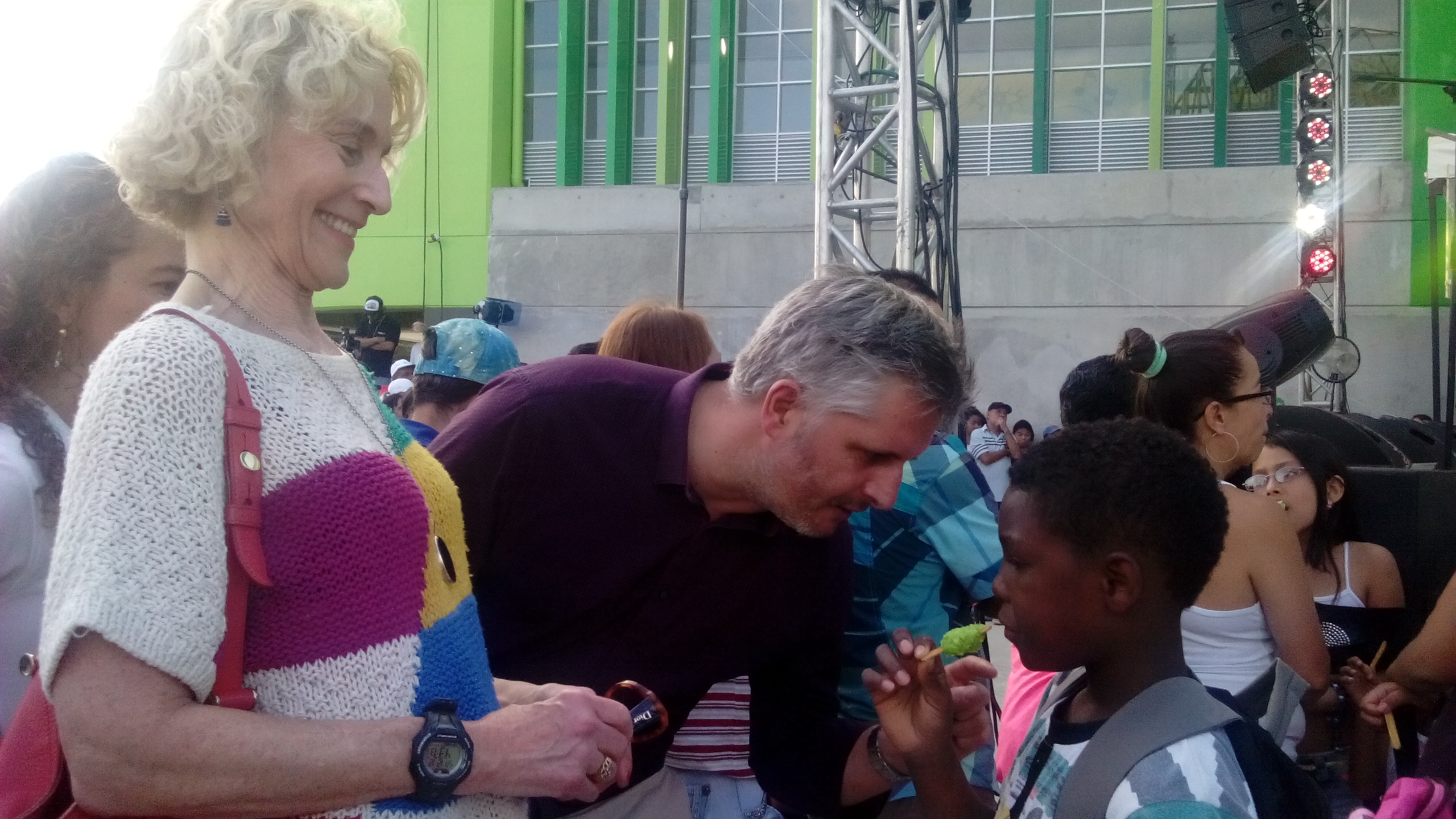
Even today, the police are totally ill-trained in this area, laws are not enforced, and women who complain of rape within marriage are laughed at. In a recent parliamentary debate, a progressive piece of legislation on sexual violence that made rape within marriage a crime was gutted, and that part dropped out. So, what I am saying is: let’s build a women’s organization, sure. But let’s also have good laws, police who enforce the laws, and in general a national commitment to the eradication of nonconsensual sex, including marital rape. That’s one thing government must do to protect women’s emotional health, and if men grouse that their privacy is invaded, as they do, we ought to reply that the home is not a space free from law. Nor indeed is the workplace, although men have complained bitterly about legal intervention with sexual harassment. So that is just one example.
Another example is bullying and harassment of gay, lesbian, and transgender children in schools. Their emotional life is warped in a very fundamental way when their peers and teachers do not show respect for them. Schools have improved a lot, but there is still a huge amount of work to be done. Disability is a similar issue: individuals are emotionally crushed by insult and stigma. So let’s get rid of that behavior. I do not think that it is too intrusive to ask all public school teachers to treat all their students with respect and to enforce norms of respect in the classroom. I realize some Americans think this is intrusive, but then they used to think that racial integration was too intrusive. In short: law protects our equal dignity and emotional health in many fundamental ways, and it should do this job better.
And what about mental health care? One of the saddest results of our Illinois lack of a budget is the cutting of mental health services for the poor. The lack of mental health services is a problem nation-wide, and many people are shunted into “quick-fix” drug treatments when what they really need is talk therapy. So let’s dedicate ourselves to comprehensive support for mental functioning.
I want the New Deal, basically, a comprehensive governmental program to make it possible for people to live free from fear (of going without needed coverage, etc.). Physical health care is in jeopardy too now, across the nation, and that is causing many people terror – they will get old, and lo and behold, no Medicaid.
These are just a few examples, but let me give one more. Adam Smith drew attention to the importance of being able to appear in public without shame. Many things affect this ability, but here’s just one that you might not have thought about: dental insurance. So many poor people have terrible teeth, because they can’t afford needed care. This makes them not only pained but also ashamed. When they go for a job interview, they don’t want to smile. And they carry themselves defensively. Often this means they don’t get the job. You get the idea now, I hope. I am saying that governments should think about fear, shame, and so forth, and adopt policies that remove the fear that is “in every house.”
As for personal privacy, which you are right to care about: defending that also requires law: the new laws against “revenge porn” are one example of legal response to a new state of affairs.
While working on capabilities, you have lived in India for extended periods of time, becoming deeply acquainted with Indian society and politics. Has this experience had an important impact on your life and career, and if so how?
Actually, I’ve never been in India longer than three weeks at a time. How could I? I have a job. (And summer is not exactly the time to go to India, though once I had to, when I was writing The Clash Within.) I was a visiting professor at Jawaharlal Nehru University in Delhi for two and a half weeks, but that did not pay my salary, in fact there was no salary at all. No organizations I work with have money, and at the other end I have responsibilities to my university, and our Law School has no regular sabbatical policy. So I go once or sometimes twice a year, during spring or winter vacations.
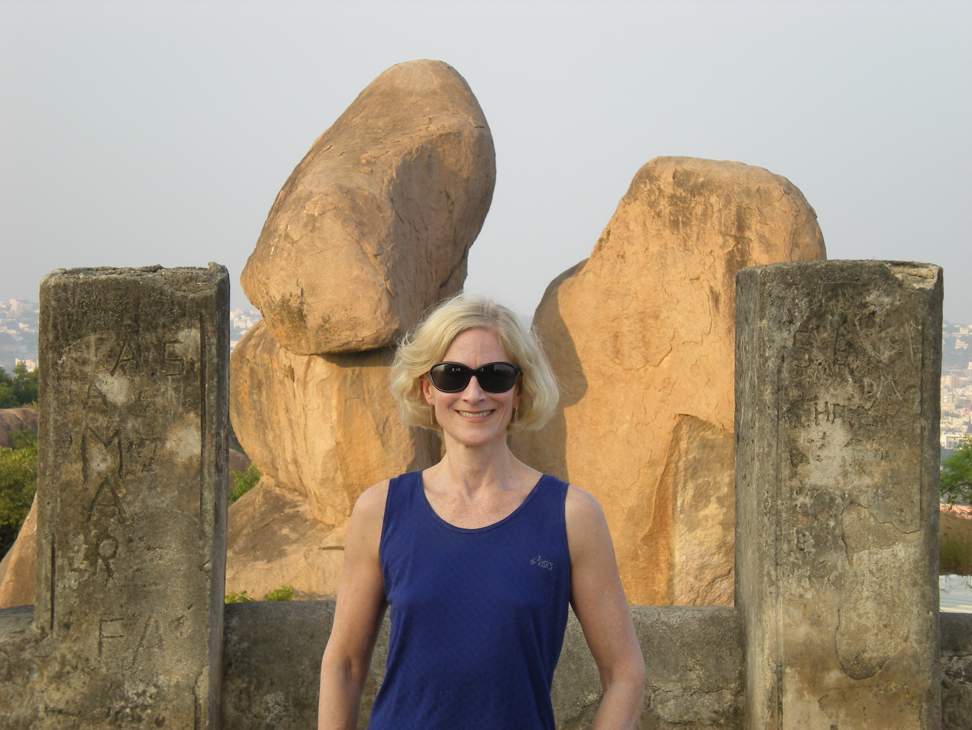
I first got to know India through the field studies Amartya commissioned for our capabilities project, and visited it in that connection. I quickly loved the country for some of the same reasons I was drawn to Jewish culture and exited from WASP culture: noise, argument, emotional openness, people protesting and demanding. I think the founding of the Indian nation is one of the most incredibly moving and appealing parts of any history I know.
When I listen to Nehru’s speeches on recordings I have, I weep. Among my great heroes in life are both Nehru (India’s first Prime Minister) and B. R. Ambedkar (the great legal architect of India’s Constitution, who was a dalit). I’ve written a lot about Ambedkar lately. And Rabindranath Tagore (1913 Nobel Prize in literature) is a third hero, a towering artist, writer, philosopher, educator. Amartya knew him, and his mother Amita knew him even better, and wrote two books about his school, so in my friendship with Amita I came to feel close to Tagore and teach his works often. Gandhi is a hero too, but of a more mixed kind, since his views about women and sex seem to me pernicious.
My main aim in spending so much time in women’s development groups in India was self-education: I felt that I needed to listen to poor women and what problems they were facing. But in the process, already half in love with India, I fell in love fully. For a long time, despite writing about development issues, I was reluctant to opine about Indian politics, since I am a foreigner. But then, as Modi rose, and the Gujarat genocide of 2002 was largely ignored in the West, my friends in India asked me to write about their struggle for the American audience, so I undertook the book The Clash Within. It was a new thing for me, interviewing politicians and so forth, but I think it worked in part because they saw me as an unthreatening figure, and they loved the glamor of being cited in a book published by Harvard University Press, so they said all sorts of incriminating things on tape and after signing a release.
From that time on I’ve been writing regularly on Indian politics for Indian newspapers and American media like Dissent and Boston Review. Our university opened a center for collaborative research in Delhi in 2014, and from the start of the process of planning, around 2009, I’ve been on the Steering Committee. I just returned from the first large conference I’ve organized there, a comparative conference on prejudice, stigma, and discrimination, which was tremendously exhilarating and exciting. The aim was to examine caste prejudice, American racial prejudice, prejudice against Muslims, gender prejudice, sexual orientation prejudice, disability prejudice, and age prejudice, asking what common threads run through all and what differences there are. This will ultimately be an edited volume. So India is woven into most things that I do.
Let us now shift to your influential normative work on emotions, which seeks to establish which emotions we ought to experience in the personal, legal and political realms. The Stoics famously recommended apatheia, or freedom from the passions. On this view, a rational person should not experience any type of emotion, with the exception of what the Stoics called eupatheiai (joy, caution and will). Aristotle recommended instead metriopatheia, or moderation in the passions. On this view, we can experience all kinds of emotions without irrationality, but we should do so “to the right person, to the right extent, at the right time, with the right motive, and in the right way” (Nicomachean Ethics). If you were to characterize in the broadest possible terms your own normative theory about emotions, would you say that it is Stoic, Aristotelian, a combination of the two, or none of the above?
Actually metriopatheia is not a word Aristotle ever uses; the term belongs to Epicureans. And for good reason: because feeling a moderate amount of emotion is not what Aristotle recommends. He recommends what you say in your quote: the appropriate emotion for the circumstances, which might be a lot, or it might be zero. So his view is actually compatible with the Stoic view, only they argue that the appropriate amount is always zero! Kant thinks Aristotle’s a silly empty view, giving no guidance, and of course he’d be right if that were all Aristotle said. But he then has detailed accounts of fear and courage, of anger, of shame.
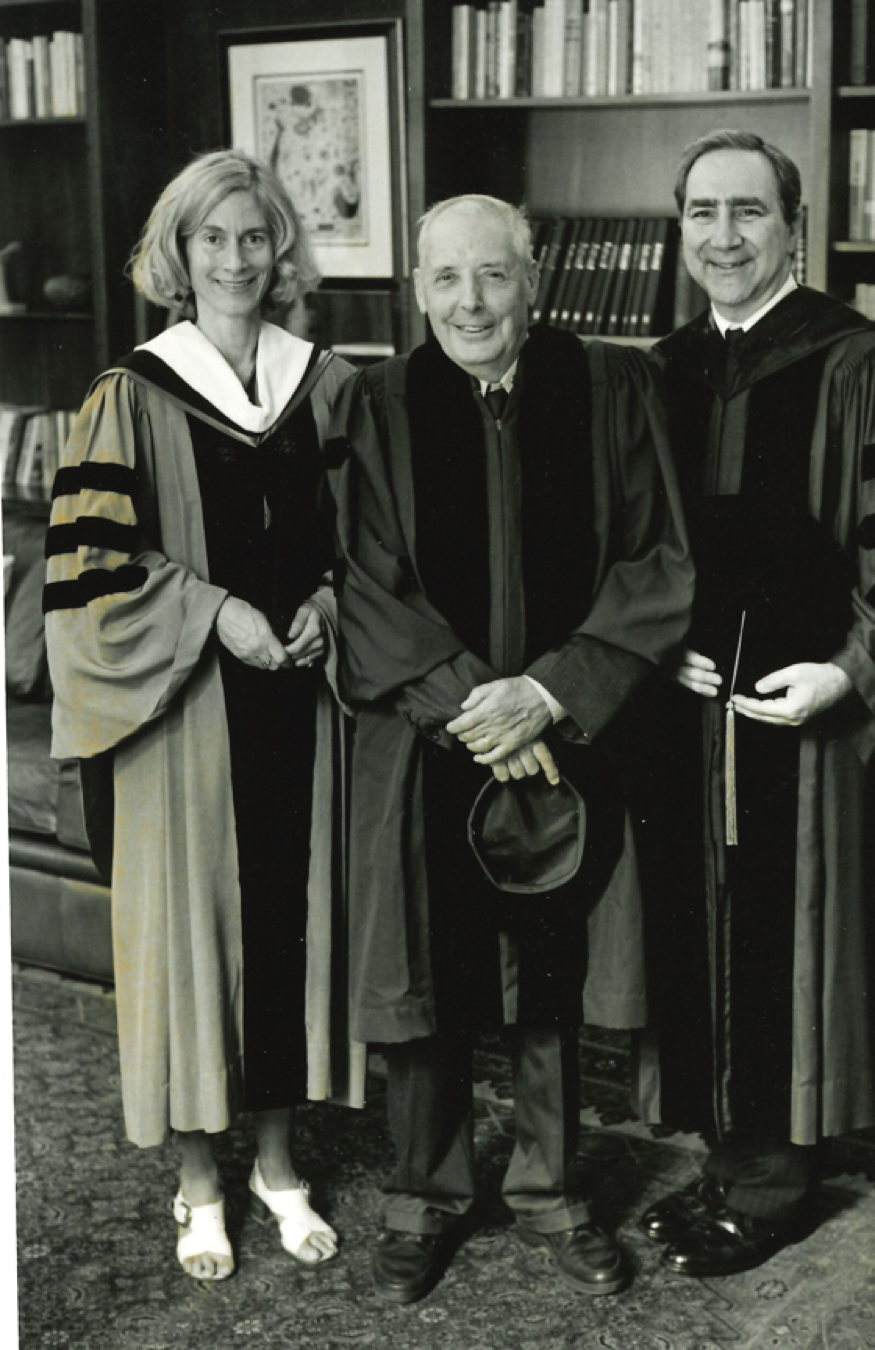
My overall view is Aristotelian, and I agree with Aristotle about some emotions: for example that the love we have for friends leads appropriately to grief if the friend dies or leaves. And I think he’s good on fear as well, insisting that a courageous person still feels fear of death, since he values his life highly and doesn’t want to lose it. On anger I differ, since he thinks that retributive projects after the murder of a parent are crucial if one is not to be slavish. Anyway, Aristotle’s in the right ballpark, looking at the texture of the whole life piece by piece and asking how emotions fit in. The Stoics are right about some things: for example when they urge us not to get wrought up about money or reputation. But their sweeping project of uprooting the emotions totally leaves life denuded of richness and politics of its urgency.
Cicero knew their writings well, but when his daughter died and the republic was imperiled he told his friend Atticus that he could not stop grieving, and, furthermore, that he did not think he ought to stop grieving. As for the daughter, his grief led him to write several works on grief that are valuable. As for the republic, his grief led him to return to Rome, denounce Marc Antony in the Philippics, and stay on too long, trying to do something to save the republic. He was assassinated as he attempted to board a ship to join Brutus and Cassius in Asia, and he courageously stuck his neck out of the litter to receive the assassin’s stroke. That’s emotional courage for you. And love. Antony ordered the assassins to cut off his hands and nail them up, since those hands had penned the Philippics. Too late, however, since the Philippics survive to move people everywhere to a love of republican liberty. (The American Revolution was centrally inspired by this period of Roman history, and in that case they did create a republic, which we had better hope we can preserve.)
In Hiding From Humanity: Disgust, Shame, and the Law, you have argued that what is normatively wrong with emotions such as disgust and shame are their cognitive contents, namely the way they construe their objects. In both cases, you have suggested that disgust and shame involve “hiding from humanity”, and that they should not play any roles as “guides to public practice”. Can you explain why disgust and shame involve “hiding from humanity”, and what guiding roles exactly they should be excluded from in the law? Finally, do you acknowledge any normatively unproblematic instances of disgust and shame in the private and in the public sphere? For example, is there anything wrong with being personally ashamed for having been put in jail, or with being publicly disgusted by the hypocrisy of politicians?
 What I mean is that disgust involves discomfort with the messiness and decay of the mortal human body. By fleeing from contamination by our own bodily fluids, we are fleeing ourselves. Walt Whitman makes this point splendidly in “I sing the body electric,” one of my favorite poems. And things get even worse when we project animality and a hyper-bodily nature onto some subordinate group (lower castes, racial minorities, women) saying, “They are the animals and I am not.” This is always full of self-deception, since the bodies of African-Americans, which were supposed to be so smelly and so hyper-sexual, are no different from the bodies of the whites doing the projecting. Think of Gulliver’s Travels and the terrible flight from self in which Gulliver engages at the end, unable to tolerate the presence of those “Yahoos” such as his wife and children, but of course never fully facing his own Yahoo-dom.
What I mean is that disgust involves discomfort with the messiness and decay of the mortal human body. By fleeing from contamination by our own bodily fluids, we are fleeing ourselves. Walt Whitman makes this point splendidly in “I sing the body electric,” one of my favorite poems. And things get even worse when we project animality and a hyper-bodily nature onto some subordinate group (lower castes, racial minorities, women) saying, “They are the animals and I am not.” This is always full of self-deception, since the bodies of African-Americans, which were supposed to be so smelly and so hyper-sexual, are no different from the bodies of the whites doing the projecting. Think of Gulliver’s Travels and the terrible flight from self in which Gulliver engages at the end, unable to tolerate the presence of those “Yahoos” such as his wife and children, but of course never fully facing his own Yahoo-dom.
I think that disgust at spoiled milk and other decaying foods is not harmful, and may even be useful. Although, as Rozin shows, it isn’t a good proxy for danger, nonetheless, it is close enough to be a good heuristic for what might be discarded. People often point to moralized disgust, such as disgust at rich bankers, as a morally useful emotion. I have a lot to say about that in Hiding From Humanity. Basically, when the word is used precisely, not as a loose way of talking about anger, it always involves a thought of contamination, and always involves a desire to separate oneself from the object. That is often a childish and useless way to behave politically. Sure, there are politicians who disgust me: I would not want to shake their hand, I would feel as if a rat had crawled into my living room. But how does that make our world better? Protest and constructive action are what we need. I think that Bernie Sanders sometimes appealed to a desire for constructive action and sometimes to mere disgust with the rich. We need to focus on the former, and learn to see the latter is an impediment, since we need to unite and work together. Dr. King pointedly asks his audience to imagine joining hands with Southerners, because we have to rise above even a moralized disgust to solve our problems.
Shame is much more complicated. With Freud I connect it to an ego-ideal, and shame is therefore often constructive, registering the thought that we have fallen short of a valuable idea. The problem is that in early infancy we become ashamed of our own finitude and helplessness, and this “primitive shame,” as I call it, leads us to want to tyrannize over others. That is a big source of evil in life, and unfortunately the good sort of shame is often infected with primitive shame, as when people stigmatize sexual minorities, or the “fallen woman,” in an effort at social control. Behind the veneer of moral argument there is often something more insidious going on.
You have relied in part on scientific accounts of disgust to make your case that disgust is problematic because it reminds us of our animal origins. In the past few years, however, the animal reminder theory of disgust has been heavily criticized. Authors like Joshua Tybur or Daniel Fessler have proposed that there is no specific animal reminder function for disgust. For example, they have suggested that disgust toward corpses, deformity, and bad hygiene functions to reduce physical contact based on the pathogen-relevant information associated with these objects (rather than their being animal reminders) and that disgust toward sex has the function of motivating avoidance of specifically sexual contact with individuals who impose net reproductive costs as sexual partners (rather than sex being an animal reminder). I am not asking you to arbitrate an ongoing scientific controversy, but to say something about the role you ascribe to scientific research in shedding light on the cognitive content of emotions. If scientific consensus in a few years were to converge on the idea that there is no animal reminder function for disgust, would you consider your theory of disgust in the law in need of fundamental revision? If not, what exactly is the role that scientific evidence plays in your normative work?
In Hiding I already make my own criticisms of Rozin, since I hold that the animal reminder view is too crude to account for the cases: some properties of animals, such as strength and speed, do not inspire disgust. I conclude that it is not just animality, but something about the vulnerability to decay and dissolution that is the lot of animal bodies, which inspires disgust. I believe this to be a friendly amendment, in keeping with Rozin’s insights and the actual data of his experiments. As for the arguments you mention, I think that they do not grapple (at least as you summarize them here) with a raft of experimental evidence elicited by Rozin, showing that disgust is distinct from a perception of danger.
So I don’t believe everything I read, with psychologists any more than with philosophers, and I think that any psychologist with a powerful theory is always going to be challenged and attacked. Dan Batson has spent forty years elegantly rebutting various objections to his theory of altruism; that’s what great scientists do. So my critical but generally positive view of Rozin is based on my evaluation of his reasoning based on his experiments. Of course if he had faked the experiments I would not know that, so that I leave to scientists to police. (A fascinating case in point was the controversy between Frans De Waal and Mark Hauser about animal emotions and altruism. I had taken the side of De Waal based simply on my own analysis of the evidence he presented, which seemed, and seems, compelling. But then it turned out that Hauser was guilty of fraud, which of course I had not known, so the whole controversy went away.)
As for the claims you mention about sex: they need to take account of the fact that some very weighty thinkers, such as Adam Smith and Freud, believe that disgust is ineliminable from human sexual contact. I am not convinced by that, but in any case, where sex is concerned, we quickly shift from what I call “primary disgust”, which is the business of scientists, to what I call “projective disgust,” which is the business of cultural historians. That is, to figure out what southern racists thought about the bodies of African-American men, we don’t look to laboratory experiments, we look at journals, letters, diaries, and so forth.
In my case, working on homophobia, we look to pamphlets aimed at inspiring disgust. When we move into cultural history we must keep an open mind and see what we find. I think that it’s a very good starting point to look at prejudice and discrimination from the point of view of “projective disgust,” asking how and to what extent racial, caste-based, religious, and gender out-groups are depicted as disgusting animals from whom the allegedly superior and clean dominant group must segment itself. Magical ideas of contamination are amply in evidence in many forms of prejudice. But not all. For example, prejudice against Muslims in India is heavily inflected by ideas of the Muslim male as hyperbodily and hyperanimal, the Muslim woman as animal and hyper-fertile. But prejudice against Muslims in the US does not appear to have these features, and is based more on fear.
Samuel Johnson famously defined patriotism as “the last refuge of the scoundrel”. In Political Emotions: Why Love Matters For Justice, you have argued instead that love of country, and a variety of other forms of love, have an important role to play in liberal democracies. In a nutshell, why does love matter for justice?
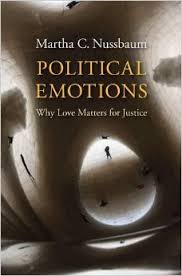 Of course there are many bad forms of patriotism, and the philosophical tradition I study there (including Rousseau, Herder, Comte, Mazzini, Mill, Renan, and Tagore) thought it was crucial to make sure that the nation was conceived as continuous with a wider world of human beings, and as based upon sound moral principles rather than on ethnicity or religion.
Of course there are many bad forms of patriotism, and the philosophical tradition I study there (including Rousseau, Herder, Comte, Mazzini, Mill, Renan, and Tagore) thought it was crucial to make sure that the nation was conceived as continuous with a wider world of human beings, and as based upon sound moral principles rather than on ethnicity or religion.
The basic problem all these thinkers saw was that people are inclined to be selfish and narrow in their sympathies. To get them to endorse any political project involving sacrifices of personal self-interest (redistributive taxation, support for national defense) they need to be summoned outside themselves by some sort of sustaining emotion. What might the object of such emotions be? John Rawls thought that emotions could take abstract political principles as their object: love for the principles of just will render the well-ordered society stable over time. I argue that developmental psychology makes this seem unlikely: we learn our strong emotions in intimate personal settings, and unless politics can somehow hook onto those early loves, it will be impotent and will not long endure.
The nation is typically conceived as a parent or a loved one, for this reason. I argue that political love needs to be particularistic in this way, but that care must always be taken to harness that particular love to good moral principles and keep people moving back and forth. Good political rhetoric does this instinctively, and I study many cases. Think of Martin Luther King, Jr.’s “I have a dream” speech. If Rawls had written it as an abstract structure of principle, the civil rights movement would never have succeeded. It was the soaring particular poetry, the rhythm of the language, its ability to capture Biblical images of love and justice, that made hearts leap out of their narrow breasts and soar toward something beautiful. Good thinkers have to do this each in their own context. King could not ape Gandhi, he had to create a different type of poetry and I would say a more openly erotic form of love, though he would have denied that. By this I mean a type of love growing out of our passionate attachments to loved people in our childhood, a love that is deeply particular (although we must tether it firmly to moral principles), and characterized by wonder and delight.
In your more recent book, Anger and Forgiveness, you have made the case that anger is normatively problematic both in the private and the public realms. You acknowledge that anger’s cognitive content – roughly, the construal of someone’s action as a wrong – is not necessarily problematic, unlike in the cases of disgust and shame. The trouble with anger is in your view a desire it contains by conceptual necessity, namely the desire for payback. Can you explain what is normatively wrong with the desire for payback? You also mention a borderline case of anger you call Transition-anger: can you explain what that is, why it is borderline, and how it avoids the shortcomings of garden-variety anger?
 You have me wrong: I say that the cognitive content of anger includes not just the thought that a wrongful damage has been inflicted on something or someone one cares about, but also that it would be good for the wrongdoer to pay for what he or she has done. Of course that latter part usually gives rise to a desire, and so I do often talk about the desire for payback, but it’s a desire with a very firm cognitive content. Anger appraises future payback as importantly good. That’s not just me, it’s common ground among all the major theorists of anger in the Western tradition, and also Santideva and Gandhi in India. I understand that the philosophical traditions of Ghana (oral traditions in origin) contain a similar view, that anger involves thoughts about wrongdoing and payback. Anyway, payback involves the idea of proportional rectification: the wrong must be counterbalanced by a pain or suffering elsewhere. This idea of cosmic balance is ubiquitous and very human, and it can take many forms.
You have me wrong: I say that the cognitive content of anger includes not just the thought that a wrongful damage has been inflicted on something or someone one cares about, but also that it would be good for the wrongdoer to pay for what he or she has done. Of course that latter part usually gives rise to a desire, and so I do often talk about the desire for payback, but it’s a desire with a very firm cognitive content. Anger appraises future payback as importantly good. That’s not just me, it’s common ground among all the major theorists of anger in the Western tradition, and also Santideva and Gandhi in India. I understand that the philosophical traditions of Ghana (oral traditions in origin) contain a similar view, that anger involves thoughts about wrongdoing and payback. Anyway, payback involves the idea of proportional rectification: the wrong must be counterbalanced by a pain or suffering elsewhere. This idea of cosmic balance is ubiquitous and very human, and it can take many forms.
Herb Morris gives it a very sophisticated form: the wrongdoer has encroached on someone else’s liberty, so it is good for his liberty to be proportionally diminished. The angry person does not need to wish to take revenge herself. She may want the law to do it, or even some type of divine justice. Or she may just want life itself to pay her back: think how often, when breaking up with someone who has been guilty of a betrayal, we wish that the new relationship will be a terrible failure, and that will somehow serve him right, give him his comeuppance. The problem, however, is that proportional penalties don’t as such do any good for the important things that have been damaged. Killing the murderer doesn’t bring back the child who was killed. The failure of the betraying ex’s new marriage does not actually fix my life, or give me a new relationship. Legal punishment sometimes does good, but not because it atones for the past. When it does good, it is because it changes the future: incapacitating a violent offender, deterring that person from committing a new crime, deterring others from committing similar crimes. The future is what we can change, so we ought to face the future, not stay riveted to the unchangeable past. Realizing this, our thought should make a Transition, facing forward and asking what actually would make sense going forward.
Transition-Anger is anger that has already made this shift. It faces the future from the start. Its entire content is: How outrageous that is! It must not happen again. So it has abandoned the thought that payback would be a good thing. Its whole question is how to make the future better, not how to inflict proportional punishment. Parents typically have this type of anger toward their young children: what the child has done is truly outrageous, but the parent wants to fix the future, making things better for all. It never occurs to good parents that they should “make the child pay”. Instead, they do whatever it is that will make the bad behavior less likely to continue.
Let me briefly follow up on our answer with a possible objection. On your view, anger always involves either a desire to inflict pain in the offender as a way to assuage one’s own pain for something that has already happened (Road of Payback), or a desire to restore a balance of status with the offender for something that has already happened (Road of Status). Since you consider the first desire irrational because of its involvement in magical thinking and the second desire morally flawed because of its involvement in narcissistic thinking, you conclude that anger is always normatively problematic. But there is a third and I would argue more common desire associated with lots of forms of anger, and it is simply the desire for the offender to stop his or her offensive behavior. I would call this the Road of Influence, because in this case anger aims to modify an ongoing behavior rather than exact retribution – in the form of payback or down-ranking – for a behavior that has already taken place. For example, when I get angry towards people who are trying to cut lines at movies, my anger is first and foremost a means, and a generally successful one at that, to the end of making them give up on their ongoing attempt. In this case, unlike in the case of getting angry at a rape after the fact, there does not seem to be anything magical in my thinking: I am in fact getting back what I want, which is that the miscreant goes to the beginning of the line. And it is hard to see why it would be narcissistic on my part to expect that everyone gets in line and waits for their turn at the movies. You discuss the theme of influence a bit when you talk about anger as a deterrent, but your focus seems to be on the deterrent effects of one’s reputation for anger rather than on the deterrent effect of actual, ongoing anger. So my question is: do you acknowledge the possibility of a normatively unproblematic Road of Influence for anger, and, if not, why not?
First of all, let’s be clear that the Road of Status is one version of the Road of Payback, namely, in my view, the only one where the payback makes sense: by pushing that person relatively lower, you automatically do push yourself relatively higher, and so long as we imagine a zero-sum exercise of that sort, where it is not absolute but only relative status that is at issue, you’ve succeeded. Ok, on to your case. As you describe it, it strikes me as a classic case of Transition-Anger: your whole effort is to make things better moving forward, and the entire content of your emotion is, “How outrageous: that should not happen again.”
I have to say, though, that things are rarely this pure, or you’re a lot better at this sort of interaction than I am. When I encounter that sort of thing (and typically it is boarding lines at airplanes), I do also desire suffering for that person, whether just the pain of going to the back of a long line, or, more likely, a certain humiliation. I’m thinking, “you think you are above it all, and now, by making you suffer, I will show you that you not as important as you think.” A little bit like Herb Morris’s retributive theory of punishment, in fact. So, if you’re free from that, it’s Transition-Anger.
I was thinking of the deterrent effect of the belief that an angry explosion is likely. Sometimes that belief is based on a person’s reputation, sometimes only on the size and behavior of their large SUV. Does a performance of anger deter bad behavior? Yes, sometimes, and I discuss this in chapter 5. I think that there are times when, knowing the culture you are in, the best way to get your message across is to give a performance of anger, as I did in the hair salon incident (where I performed anger in order to underline for management the unsafe condition of the cabinets, which had allowed a large bottle to drop down on my head while I was having my hair washed); and as the Utku (studied by Jean Briggs) think Jesus did with the money-changers in the temple: they say that of course he was not really angry, since he was perfect, but he understood that in that culture a performance of anger was the best way to get his point across.
Richard Sorabji, in his generous comments on my manuscript, said that he often used a performance of anger to influence his children. But the first point I’d make is that the performance is better than the real thing, because more easily controlled. And, second, even performance is probably not the best way to lead to a world of peace. I would worry about whether children would be getting a mixed message from Richard’s behavior. (I think the hair salon is different, since by performing anger to the management I was going to bat for the employees, who did not misunderstand me, and were not likely to imitate my behavior; moreover, the incident was a one-time thing, whereas presumably Sorabji’s performance with his children was repeated.) One thing I will concede: non-anger is not always well received. It is sometimes read as being cold or unfeeling. In a woman especially, it tends to be read as superior and condescending. But then it is not my business to cater to men who think that women should behave like submissive irrational beings.
One of the common themes in the public commentary on the rise of Donald Trump is that his campaign explicitly aimed to elicit anger and fear in the electorate. Do you agree with this assessment? More generally, do you see any fundamental differences in the way Democrats and Republicans cultivate the emotions of their potential voters?
Yes, I totally agree with this assessment of Trump, and this will be the topic of my new book, Powerlessness and the Politics of Blame. I think that Democrats are sometimes guilty of playing on fear and anger too, for example a resentful desire to smash elites without any realistic constructive analysis. I think that Sanders is admirable in many ways, but by inviting people to feel anger and in a sense fear of elites, and then offering them only hopelessly unworkable programs, he encouraged emotional irresponsibility.

I think the model for how one should conduct a protest movement is Martin Luther King, Jr., who never unleashed protest without cultivating hope and a desire for concrete types of cooperation and reconciliation. Mandela too. We need figures like that. My former student Ro Khanna, whom I’ve mentioned, gave a victory speech, citing Lincoln’s Second Inaugural, that was deeply moving in its hope for reconciliation, and his entire campaign, in a district including the elites of Silicon Valley and the poor people of East Palo Alto, was a model of bridge-building. Ro is a good model for the future; Sanders is too retributive for my taste. Hillary was just so muzzled by the attacks made by Trump that she did not inspire any emotions, unfortunately.
Your productivity is proverbial. You have so far published 24 books, 22 edited books, 448 articles, and 69 book reviews. What motivates you to work so hard? How do you achieve your amazing feats of productivity? What is your daily routine?
I am not a stressed-out person. I get 7-8 hours of sleep a night. I enjoy my friends and close relationships. I also like shopping, cooking, opera, concerts, movies, and even sports. And I watch TV: it might not surprise you given some of the things I’ve said about sexual violence that “Law and Order SVU” is my favorite show. (And it isn’t a retributive show: it’s about the victims and how to repair their lives, and also about the toll that this effort takes on the various law enforcement officers, superbly acted.)
First of all, I am coddled in an amazing way: I have tenure at a first-rate institution that lets me teach more or less what I want, and if in any given year I needed to teach less I could do it, though in fact I do not. I am not given too much committee work, although the law school exacts a lot of presence at workshops and lunches; but that is so great, because it builds an exemplary intellectual community in which I have the best colleagues in the world, who teach with me, give me incredibly great comments on work, and bring me ice cream if I have a tooth pulled.
I have rules: I do nothing but write in July and August, and every morning when I wake up, I love to read my email and reject lots of invitations before I get up! It makes me feel free. The only times I travel internationally are June 15 to 30 and December 5 to 20. And within the US about one out-of-town lecture or conference a month, never canceling classes.
So I get up around 6:30 AM, have coffee, juice, and an energy bar, do some type of cardio from 8 to 9 (usually running, on the gym-quality treadmill in my home), and then some situps or arm weights, and twice a week in the late afternoon I go downtown to my gym to do weight machines. Then at 9:15 or so I shower, dress, and practice singing until around 10:15. Then I go to the office. After that it all depends what and when I’m teaching, whether I have taught that thing before, whether we’re interviewing job candidates or I’m on a tenure committee or whatever. Basically, I write whenever I don’t have something else to do. I love writing and get to it eagerly whenever time permits. But in the evening I just read stuff, and don’t typically write. So that’s the plan.
I think I am productive because I am happy and look forward to writing. Amita Sen called her book about Tagore’s school Joy in All Work, and that’s sort of how I feel. I am only miserable when I can’t get any time at all to write. Last year I taught five courses, and I did feel a little irritable by the end of that. (The reason was that the Law School paid for Anthony Freud to come and co-teach the opera class that I’ll describe shortly, so in return I thought I should regard it as an add-on, not one of my usual four courses.) So I asked the Dean if instead of my doing the opera course as an add-on I could count it toward my regular teaching load, and since the students really liked the class, including lots of law students, he said yes.
I have read that your principal hobbies are singing and working out. Is that right? What do you find rewarding about, respectively, singing and working out? How much do you do of each?
Running is one passionate hobby, and I have been a runner since around 1969. I still run half-marathons. Mind you I have always been very slow, and in school I was about the worst at all sports, so it was a boost to discover that I could go a long distance very slowly. Because I am not trying to set records but just to finish, I have great pleasure in running and rarely get injured, and I don’t look back at my younger self and think how much better I used to be. I also do weight training twice or three times a week, which is one reason I do not get injured. Most people my age have blown out their knees. But by strengthening the quads you take pressure off your knees. I also run on a soft surface (gravel, dirt, an outdoor track, a good treadmill) when I can, and my favorite half-marathon is in a forest preserve on a dirt track. I love experiencing places while running through them, and I find the contemplative aspect of running very joyful. I don’t think of work, I usually listen to audiobooks, but it certainly helps ideas germinate.
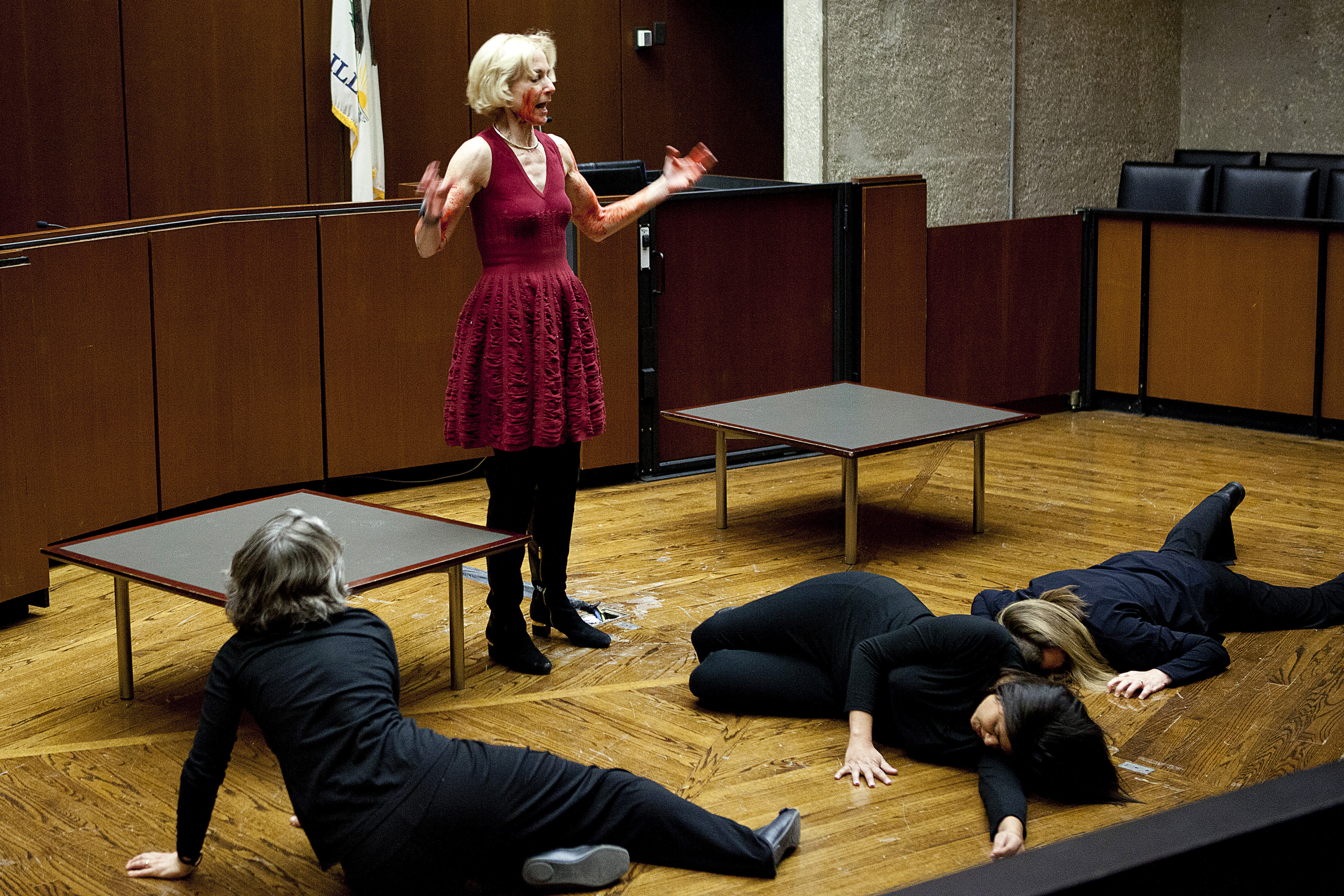
Singing was my great passion already in high school. I was a pretty good pianist, and I soloed with a local symphony orchestra, but acting and singing were what I really enjoyed. I was a professional actress for a while, between my first three semesters of college and my last two years; and now I still act in plays we put on at the law school. I was recently Clytemnestra in extracts from the Oresteia. But singing: I had talent, but I also had lots of allergies and still do. In those days, the only treatments were powerful antihistamines that put you to sleep. So I had to give up singing. I took it up again in 2008, when I was preparing for my adult bat mitzvah, and, lo and behold, with the aid of new allergy medications and a wonderful teacher, I made rapid progress. By 2012 I could sing opera arias that I really love. I take one lesson a week and sing around an hour a day.
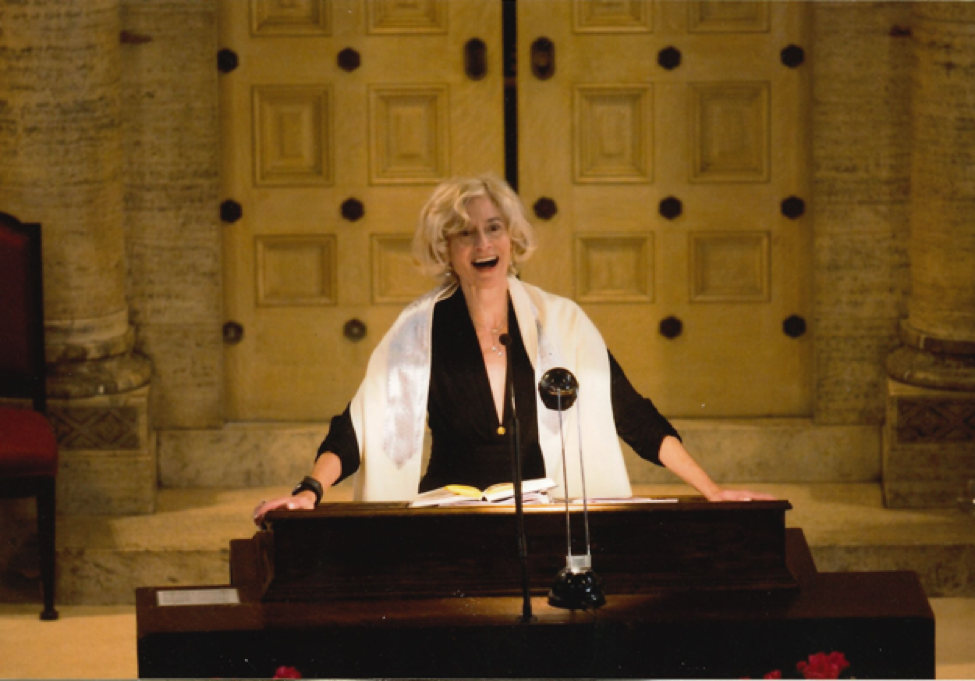
I perform in my teacher’s recitals and at other events in the university, but also at my temple, both in the choir and as a soloist. My voice has strengths and weaknesses. I am, it turns out, a dramatic soprano with very powerful high notes, and can perform up to high C sharp. My low notes, however, are weak, so I have to choose carefully. Things I’ve performed recently: “In Questa Reggia” from Turandot, “Or Sai chi L’Onore” from Don Giovanni, the sleepwalking scene from Verdi’s Macbetto. Right now I am choosing pieces for a February recital, and will definitely do the suicide aria from Madama Butterfly, with either her earlier aria, “Un Bel Di” or “Mi Tradi Quell’Alma Ingrata” from Don Giovanni. I’m also working on Rezia’s big aria, “Ocean, thou mighty monster,” from Weber’s Oberon (the original libretto was indeed in English), but that is too long to sing in a recital.
I am totally fascinated by opera, teach a class on opera with Anthony Freud, general director of Lyric Opera of Chicago, and write program notes for Lyric. (I’m their go-to Mozart person.) I plan to write a book on opera before long. But the experience of singing is such total joy. Of course it takes hard work, and it is also a nerve-racking sort of performance, as even the best singers will tell you, since the voice changes with the weather and with bodily conditions one may not be aware of. I’m sensitive to a variety of allergens, to indoor dry air (I am a zealot for measuring the humidity of our office building, which is usually at a level that the Illinois Department of Public Health calls “hazardous”).
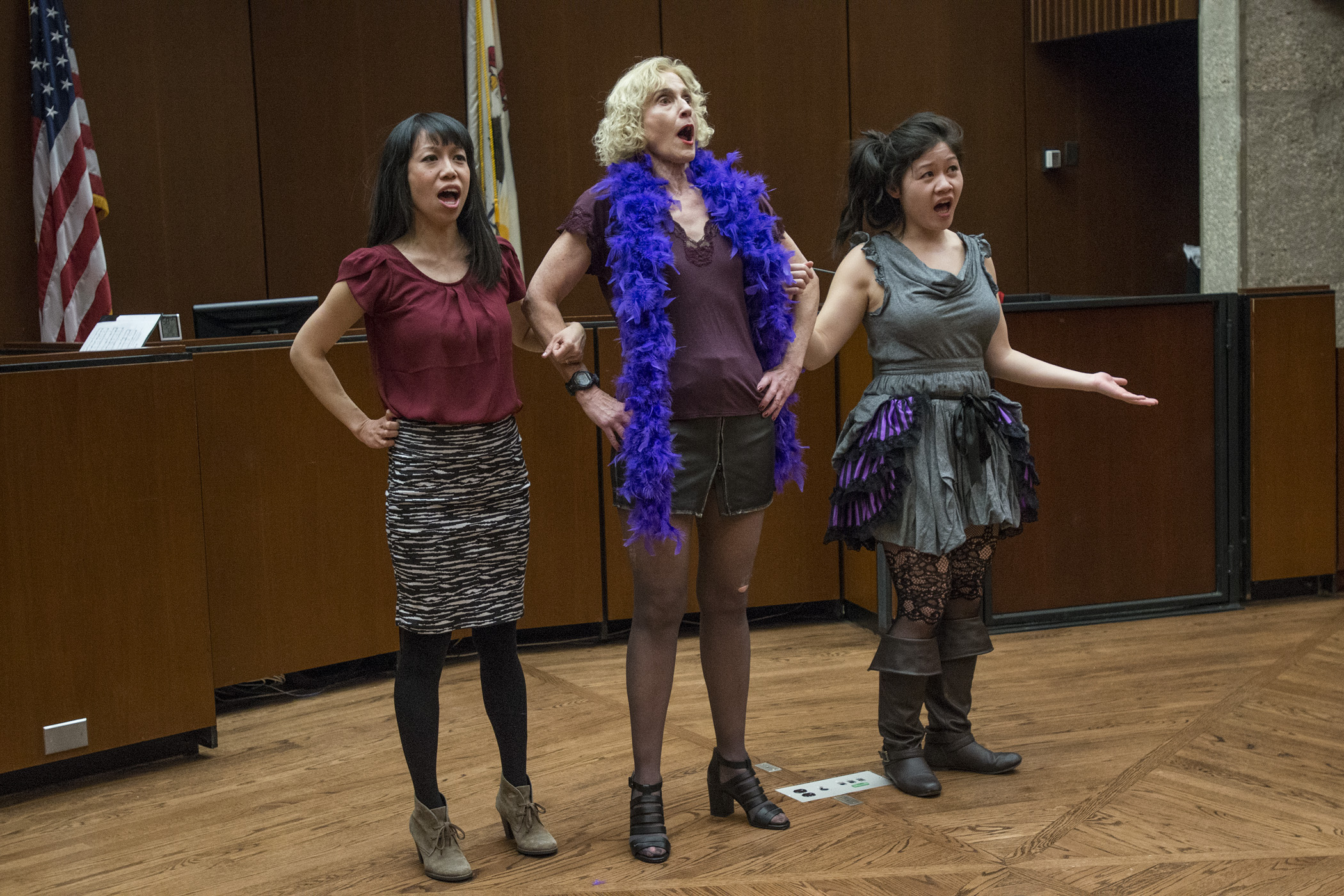
Yesterday in my lesson my low notes were even weaker than usual, though the high notes were fine, and I got worried that there was some serious vocal problem – and then, to my relief in a way, this morning I woke up with a chest cold – so that’s a singer’s life. You have a problem, and you only find out why the next day. I could not stand to do it professionally, too uncertain and stressful. Still, what joy! I love the feeling of the sound buzzing in my sinuses right over my eyes. And getting to the point of being able to interpret the character, that is really great. Another voice teacher who heard me do Turandot said that I had made her more human and vulnerable, and that was really wonderful for me to hear.
I think perhaps the Lady Macbeth was my favorite because of its enormous dramatic range and subtlety. It’s much better in Verdi than in Shakespeare, since singing can go to emotional places that even great acting can’t: you simply use more of your bodily equipment. I want my book on opera to be about the connection between breathing and emotional and political freedom. I am fascinated by Elektra’s statement, in Strauss’s opera, that she feels choked and stifled, as if something is around her neck. That is what anger does, and Strauss understands that. So her music has to be, in a real sense, anti-music and anti-breath, until at the end she simply falls silent and dies. (You asked about a recording, but unfortunately there has never been a recording of my singing, to my knowledge.)
This is the wrong place to insert this, but you did not ask about my religious affiliation and its importance. I am a convert to Reform Judaism, and I find it a very important course of emotions supporting the pursuit of social justice, both through the community and also through the ritual and the music.
You are 69 years old, and currently writing a book about aging in collaboration with Saul Levmore, a colleague at the University of Chicago Law School. Can you give us a preview of a couple of themes of your forthcoming book?
Yes, Aging Thoughtfully is now finished and in production. It will appear from OUP in fall 2017. Saul is a remarkable individual. Brilliant, a leader in his field, but also with deep human understanding. He was Dean of the Law School for 8 great years, and has an unerring sense of how to build an intellectual community. He wins the teaching prize virtually every year. He is hilariously funny, but also very perceptive and curious about people. A great father, an equally great friend. He can make me laugh better than anyone ever, often by teasing me relentlessly about my obsessions. At our Roundtable lunch sometimes he will suddenly make a point about India or feminism, just to make a gentle point about how I always talk about India and feminism. (But then he was made the chair of our campus committee on sexual violence, so now he can’t do that particular joke any more, people are used to seeing him as a feminist, which he is.)
We both think that friendship is one of the most important aspects of aging, and that one crucial aspect of the friendship that sustains is humor and teasing. So I guess what we are doing is to illustrate the conversation two friends might have, sometimes serious, sometimes light-hearted. We take as our model Cicero’s correspondence with his friend Atticus, the dedicatee of both On Aging and On Friendship (written when both men were in their sixties, and looking ahead – the lead character in Cicero’s dialogue on aging is 83). Unlike Cicero we didn’t write in dialogue form, but the book has paired essays that respond to each other. Its basic idea is that aging is not just pain and death, it is, increasingly, a long span of life, maybe thirty years, and there are lots of things to think about: friendship, love, sex, money, whether compulsory retirement is good or bad, how we might deal with age discrimination and the stigma attached to the aging body. There’s one part that talks about backward-looking emotions: are they ever useful as one ages, or should one avoid dwelling on the past, since it can’t be changed.
Please list five articles or books that have had a deep impact on your thinking.
Why do you insist on articles or books? I would rather include musical works as well. So: Mahler’s Second Symphony, Aristotle’s Nicomachean Ethics, the tragedies of Aeschylus, Sophocles, and Euripides (sorry), Mozart’s The Marriage of Figaro, Verdi’s Don Carlos.
What are the main challenges the philosophy of emotions should focus on in the next few years?
I don’t like to tell people what to do. Progress in a field usually comes by encouraging people to do what they love most.



